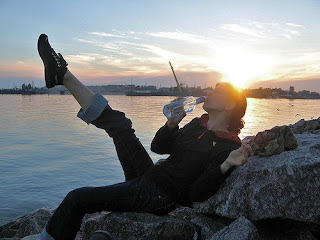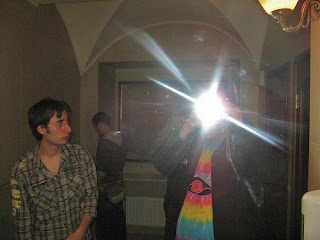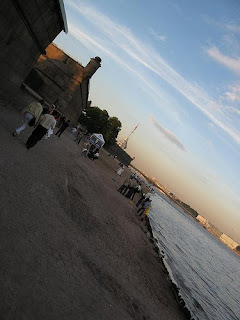We decide to go and visit Catherine’s Palace, Tsarskoe Selo, and jump a train and a bus in that general direction. The palace gardens distract us for hours, they are beautifully laid out and filled with interesting diversions. The pathways lead us through varied garden styles that are all bursting with life in the short Russian summer. From the tall hedges bounding gravel paths near the front of the palace, to more wild forest near the edges, these gardens are glorious. We pause by the lake a few times in different places to drink some water and eat ice-cream.
 The temperature is in the high twenties and fairly humid as well, so we are all sweating in the sunlight; something none of us expected to feel in Russia. We stroll down an asphalt walkway near a small stream and Don notices something on the ground. He looks closer then starts taking pictures. I crouch down to discover two bees having sex. The three of us crowd around the strangest pornography show for a minute before continuing our stroll.
Shush Lari
The pathways divide and merge, leading use through different areas of the extensive gardens. We walk by a field of waist high grasses with flowering shrubs interspersed along the edge of the path. It leads down to a tiny stream lined with tall trees shading the water with broad, rich green leaves. The grass field gives way to an open lake with an island in the middle of it. It’s possible to take a gondola ride on the lake, or take a punted ferry to the island, but we’re not inspired by either idea. Apparently the island used to be where Catherine would place musicians such that she could hear them play from anywhere on or around the lake.
 We eventually make it back to the palace and realise we have only covered three quarters of the grounds during our almost three hour visit. We notice you can get a ride in a horse drawn open cart that would take us through the final sections. After some negotiations and bartering, the three of us board it and we are transported around the broad pathways near the palace buildings.
Dear Miss Lari cooling herself in the carriage
It seems the right time to finally venture inside the palace buildings so we join the queue. We wait for twenty minutes before really noticing that it isn’t moving very much. I investigate further and discover that in the afternoon, tour groups on buses have priority on the palace buildings and anyone else must hope they have a cancellation or are not fully booked. We decide we don’t care so much and head back to the city.
Because every palace needs a pyramid
On the way I start telling my erstwhile companions about my plan to get a private boat ride on the canals whilst we drink champagne and live it up a little. Alisha is happy to help us realise it and Don and Lari think it’d be good to see the city from the boat in any case. We meet Alisha in the city and hunt along the canals to hire a small boat. After a couple of options and the best part of an hour it’s on. Don and I head for a local shop to find champagne and snacks and the girls wait by the river in a small café.
We return half an hour later with bottles of champagne, plastic glasses, cakes, lollies and weird chocolate biscuits. We jump on board, crack a bottle, give the pilot some and settle in for our journey. We travel down all three canals and out onto the Neva river again, enjoying the iconic bridges and buildings passing by. The pilot occasionally turns around to tell Alisha something about buildings we pass and she translates for us. The history of this amazing city is once more proudly on show and once again I wish I had another lifetime to spend painting it. We settle for drinking champagne and saluting random people passing by as the day begins to lose the sun’s warmth.
While we have been enjoying this expedition, black clouds have been rolling in and a chill wind springs up. The pilot hands the girls some blankets and Don and I make use of the warming effects of champagne combined with the chocolate marshmallow biscuits. As we turn the final corner to head back to the pier the rain starts gently. It seems only a few moments before very threatening, ominous black clouds churn above us. By the time we jump off the boat onto the shore it is going through a calm patch and we hurry off into the darkening city. We only make it to the corner of Nevskiy Prospect when the thunder and lightning break out and a downpour is upon us
Our two babushkas sheltering from the storm
The buildings of St Petersburg are designed more to cope with snow and ice than summer storms, so there is no shelter on the streets anywhere. We see a Japanese restaurant and charge into the door as thunder and lightning crash around us and the rain reaches the pitch of a tropical storm. The three of us are at once elated by the run and the power of the storm, yet still cold, wet and miserable as a result of its effect. We try to acquire some beers while we’re standing inside, but the waiters seem entirely uninterested in serving anyone. After a healthy banter of comments about genuine Russian service, the storm rolls past us. As our group returns to the street, Alisha asks me,
“Is that what you wanted? What you thought about?”
“Yes to the boat trip….it was a lovely piece of decadence on holiday, but the storm was unexpected… but fun anyway.”
I’ve always liked a good storm, growing up in Darwin and surviving multiple cyclones brings it out in you I think. We resolve to head for home to get some sleep on our last night in St Petersburg; thinking what a curious farewell the city gave us.
So the next installment is to talk about the Chinese family and work ethics and then the difference between China, Hong Kong and Taiwan in these troubled modern times. These answers can all be summarized fairly quickly, so here goes. You must listen to and look after your family at all costs. This especially means you must add your own children to the family. Secondly, you must be at work for as long as feasibly possible on any given day. If you can be there longer than that, then you should. Next, Hong Kong is an outpost of English Chinese people and Taiwan is an outpost of American Chinese people. Allow me to go into this a bit more to put all of this into some context for you.
The Chinese work ethic is famous worldwide already; falling fairly under the ‘good fortune’ philosophical mainstay. Seeing some particulars on how it works in the homeland was quite interesting, everyone really wants an office job, but its not anything to do with the work. It really doesn’t matter. The competition in the office job is who can sit at their desk longest on a daily basis. You could be doing nothing at all, surfing the web, sorting the same paperwork a thousand times, it also doesn’t matter. You just have to be there and be seen to be there longer than everyone else. Since the idea of a true meritocracy flies in the face of the guanxi principle we’ve already seen, I can tell you which is in active operation; guanxi wins every time. So if you get noticed for always being at work, you become a ‘good worker’, if someone higher up labels you so, then your guanxi status improves. Everyone else wants to know you and hopes for the same labeling, so they can increase their guanxi stakeholding.
The idea of individuals actually doing the best job in the shortest time simply never occurs to anyone. Why would you do that? Many people are paid by the hour, so why finish work quickly? Even when you’re on a salary, promotions are a hundred times more likely to come from guanxi connections than actual talent; so again, why bother? The thing you want to spend your time doing is cultivating your guanxi connections in any way you can. The first way to do that is by hanging around at work longer than anyone and trying to get noticed for doing it. Managing to do favours for people in higher positions is pure gold, your real aim at work is guanxi status, not actual work.
So is guanxi another name for corruption? Well, yes, in many ways it is. This is a huge mechanism for corruption and nepotism, hard cash is the other most common means to achieving your ends. However, since your average chinese citizen simply doesn’t have that much hard cash, guanxi is easily more common. I remember reading a fascinating story in a chinese news publication that kind of ties a lot of these ideas together. So the first thing you need to know is that technically prostitution and brothels are illegal in China. So when a medium ranking public servant walks out of a brothel into the arms of two undercover police officers, an interesting situation occurs. They agree to let him go if he pays a ‘fine’ (bribe) of 5000 kuai (just over AUD$900). He manages to bargain the ‘fine’ down to 2300 kuai; demonstrating the chinese bargaining instinct hard at work. He then calls a friend of his who has the money to come and bail him out. The friend arrives and after some further confrontation, it turns out the ‘police officers’ are just a pair of guys trying to make some quick cash. There’s a scuffle and everyone separates with no money changing hands. The friend turns out to work for the police and quickly recognised the criminals. In all of that we see corruption working at a couple of levels, firstly everyone knows its illegal to visit prostitutes, but its very common to do so. The criminals recognise this as nobody wants to be officially punished for visiting a prostitute and will pay moeny or favours to escape it. If you are officially punished you lose a lot of your personal face and guanxi as well – people dont want to be associated with a criminal. He uses his own guanxi to escape punishment, firstly with money and secondly with his connection to a police officer. Either way he knows he’s safe from real punishment.
So by this time you’re probably thinking how damn backwards they are for still behaving like this. You’d be wrong. The overall behaviour is largely identical to corporate behaviour worldwide. Anyone who’s worked for a multinational, or just a very large company, should recognize everything I just described. Playing golf with the boss, cultivating a group of influential friends you have coffee, lunch or beers with or just flirting with all the boss’s secretaries to get better access to the decision makers. So what am I saying? That the Chinese people operate on a cultural basis like one enormous corporate entity? Yup. Some people from every country work this way, here it forms the basis of shared understanding of life for everyone. Guanxi makes life a corporate challenge.
So even people who don’t work in an office environment follow the rules. From street hawkers to builders, bus drivers to tourist site workers, life follows the same pattern. Everyone understands it and follows it relentlessly. In fact, following the plan particularly relentlessly will earn you respect and further guanxi. So what is the plan exactly? You have to take every opportunity afforded you by your family to apply the principles of good fortune and good health to yourself and your children. Family is still king, the family unit is extensive and normally strong, but is a changing form in the aftermath of the single child policy. Instead of also competing with a host of brothers and sisters for family favours, it’s very common for the only child to have been endowed with anything that the family could provide. This will be the best education they can afford, connections with the best other families that they know for marriage partners and all the support they can give.
The pressure to be married and raising children is still enormous and only grows with age. To be unmarried at the age of thirty is considered a family tragedy, doubly so if you’re a woman. The curious thing is I met quite a few unmarried people in their mid to late twenties who had no particular plans on marriage or children for years. The problem for the family is this child knows they are the only way the family can continue, so they can do as they damn well please. This is one facet of what I hear they call ‘little emperor syndrome’. The second facet is about the status of women in society. Since most families preferred to have boys as their only child (and would do pretty well anything to ensure this), the result is that today there are too many men in the community competing for the attention of the women. The women know this and have high requirements for any potential partner. Good job, good family, good fortune, good health. So the system is driven even harder for men now.
Now all of those comments about family and the single child policy only apply strongly to the city dwellers. These are the people who have a higher chance for receiving a good education and the opportunity to find jobs that pay well. The country Chinese people have a different fate. Apparently the single child policy wasn’t enforced so strenuously out there, so many of the old rules still apply. The difference between country and city dwellers is one of money and opportunity, which explains why urbanization is happening at an incredible rate. I, however, spent little time talking to people from these regions, since I can’t speak Chinese. The vast majority of locals I met and spoke with were from the privileged educated middle classes, so you should take that into account with everything I’m saying.
So back to the question of Hong Kong and Taiwanese culture. In Hong Kong most people have British English accents and a largely English outlook on the world that is layered over the first two parts of this series of posting. They’re cynical, very aware of the global community and constantly operating with the knowledge that the existence of Hong Kong as a financial giant is limited. After I’d being in Shanghai, which feels like a young man just turning twenty, filled with energy and opportunity; Hong Kong feels like a middle aged man. The pace is slower, but more refined. The Chinese government has signed the death warrant with the phenomenal development of Shanghai as the new financial heartland of the Eastern world. Whether you think it is now, or will be in ten or twenty years, we can all see the inevitability of it. So what’s the point of keeping a hold of Hong Kong? My main suspicion is the Chinese government have used Hong Kong as a living experiment to learn from. They’ve learned about global business, global trading and how to make the whole thing work from an office in the middle of south east asia. They’ve learned first hand how the British were making the place so astonishingly successful. Now they’re finishing the learning phase and heavily applying it to Shanghai. Been nice knowing you Hong Kong.
I was informed by a few people that I might have trouble getting work teaching English in Taiwan. The problem is my accent is all wrong. Not American enough. Perhaps if I worked on sounding more American I’d have a chance. In mainland china the requirement to teach English is to have white skin. This means that vast majority of English teachers I met in China were not native speakers, rather Europeans enjoying a working holiday. In any case, Taiwan’s status as an American outpost is everywhere. Hallowe’en and thanksgiving are well known, Christmas is celebrated in exactly the same frenzy of commercialized bollocks. The Americans aimed to have buffer states around China and all I can say is ‘mission successful’. This isn’t to say that I don’t like the Taiwanese people, on the contrary, they’re my favourite Chinese subculture. They don’t have the naivety of the mainland Chinese when it comes to believing the media and they don’t have the intensity of the pursuit of money that I found in Hong Kong.
They are very globally aware and a lot more relaxed than the mainlanders. The pace of life just doesn’t have the frenetic desperation of the permanent pursuit of good fortune. The quality of life is good and they know it. They’re very familiar with foreigners visiting the country, especially Americans, so foreigners hold no special status. In mainland China there were many times when I’d be stared at in curious amazement by older people. Chinese mainland women who could speak English would make a point of talking to me almost anywhere. Many Chinese women want a foreign husband, mostly ‘good fortune’, but white skin is a huge requirement – its considered very attractive. However, in Taiwan, you’re just another person.
One of the most consistent conversations that came up while I was in the country was how long it would be before they reunified with mainland China. Estimates ranged from five years to twenty five years. I think ten to fifteen years is the mark. There’s some hints the government is moving that way, they’re starting to change the English versions on signs everywhere to use only pinyin – the mainland standard. They’re also looking to shift to using the simplified Chinese characters the mainland adopted some time ago. Things that used to be a sign of Taiwanese independence are now slipping away as an impediment to progress. A couple of people commented they’re really waiting for the older generation to die or relinquish their jobs and influence. Once mainland China’s feet are firmly planted as the economic heartland, the Taiwanese people will follow the call. After all, at the end of the day, it’s a move for good fortune.
I wake up at some later time to find Don has appeared sleeping on the other side of the bed, clutching a bottle of vodka. I roll over and go back to sleep. I manage to stand up around three in the afternoon and shuffle into the kitchen to drink all the bottled water in the house. I get through two litres and some balance returns to my day. I figure we’re not going to Gatchina anymore and there are a lot of missed messages on my mobile phone asking where we are. I go back to sleep and awake to find Don has recovered and is sitting in the kitchen. He doesn’t know how we got separated either. Apparently he spent a few hours staring blankly at train station signs written in Russian as he searched for Alisha’s one. He had also acquired a bottle of vodka with the intention to wake me up to demand I have some so we can keep going and join the group at Gatchina. He fell asleep on the train and was woken up at the end of the line, then kept jumping out at every station on the way back to see if he’d made it home. Finally he did and surged into the street to jump on the marshrutka, only to be stopped by the same two policemen who grabbed me. They must have thought it was Australia day or something as he staggered off. He fell asleep on the marshrutka and ended up back at the train station once before finally making it to the apartment around eleven. Apparently Lari opened the door to see him clutching the bottle and he managed one sentence before passing out next to me.
“I’ve just had the most amazing morning.”
 The beach sunset
The girls have headed into the city to lodge paperwork to get Lari registered in Russia. Since she’s just arrived, she needs to be registered somewhere and Alisha is able to do this for her. Alisha actually needs to be registered in St Petersburg herself, so it’s easy for her to fill in the form for Lari at the same time. All Russian citizens have to register in a city in their own country if they are there for more than three months, which she has been. Everyone has one passport for moving around inside the country and must apply separately for a passport to actually leave Russia. The first one is just like the ID cards used in a number of countries as a primary form of personal identification. In order to get that external passport the individual has to fill in a bunch of forms in their home city that get sent to Moscow and used as doorstops for half a year. When its life as a doorstop finishes the person is notified and they then must travel to Moscow once or twice to submit more forms and be interviewed, photographed and otherwise tortured by the bureaucracy. Getting your external passport apparently takes six to eighteen months depending on whether the bureaucrats have already had their hearts and souls removed to feed the demons within the government, or are just working towards it.
 Beachside vodka session
That’s only the beginning; however, a Russian citizen wishing to actually leave their country has to submit even more paperwork. They have to tell their government where they will be staying for every night they’re outside the country – and prove it. Hotel booking confirmations, formal letters from people they will stay with, every single day must be accounted for; or they don’t leave Russia. We spoke to one woman in Moscow who used a credit card to book everything online to get the required proof. Once the government approved her journey, she would then go and cancel everything and do whatever she wanted. All of this goes to explain why Russian tourists are a limited commodity. To have the time and money to just acquire the external passport is beyond the ability of most citizens. Even if they manage to get that, then being able to afford to travel is a luxury largely reserved for residents of Moscow and St Petersburg and the odd wealthy family in other cities.
 Even Russians pull faces after drinking vodka shots
On their way back Lari and Alisha have decided that we’ll have a fire on the beach tonight and they bring back the firewood. Energy levels are low, and the fruit juice they also bring is helping a lot as we wander very slowly down to the beach carrying firewood and paper. We have no clear idea how we’re going to light it without kindling, but the attempt should be amusing anyway. After I shuffle around logs and some cardboard for a while, Don notices some hot coals and adds them to the mix.
Don questioning the manliness of the fire
I spend a lot of time fanning it and eventually the pine logs burst into flame. For about a minute, before needing vigorous fanning again. We can’t find any kindling, we have nothing to split the logs and it looks increasingly hopeless. The only answer is to have some more shots of vodka, which we all do a few times. The sunset is lazy and cloudy and we alternate between water and vodka shots and take increasingly silly photos of ourselves on the foreshore. I suddenly remember an idea I had back in Australia and lurch down to the water and put my hand deep into it. I then touch Don and Lari’s foreheads with that hand, leaving a vertical stripe above and between their eyes.
“We’ve touched the water of the Gulf of Finland on the Baltic coast of Russia. Now we have to swim in the water of Vladivostok at the other end of our journey.”
They both nod lazily. We finish the drinking water before heading inside to sleep again before the next adventure.
It’s 2001, I’ve been living in Melbourne for less than a year and life is just getting more interesting. I’ve spent some time writing a script for a short film and my plan is to film it this weekend. This poses a few problems; paramount among them is that I don’t even own a still camera, let alone a video. Fortunately my friend, Ray, has one and is happy to work with me on the weekend to make the film. So it’s about a guy who suffers from a very curious psychological condition. His world is split into left and right, but he is largely unaware of everything on his left side. I’d read about this condition in an amazing book called ‘The man who mistook his wife for a hat’, by Oliver Sachs. In the story from the book this person would eat everything on the right hand side of a plate and leave everything on the left – it was invisible to her. Oliver teaches her to turn the plate to make the rest of the food visible and she was always surprised when more food suddenly appeared as she turned the plate. I thought a short film about such a person would make pretty fascinating viewing.
So the main character, to be played by myself, manifests this disorder in a number of ways, but the most obvious is that his right hand side is cared for and dressed as a corporate professional, but the left hand side is always unkempt and shabby. The most startling manifestation is that the left hand side of his face is dominated by a large, red beard, whilst the right hand side is clean shaven. The hair on the left side of his head is long and ratty, on the right it’s kept very short in keeping with the professional appearance. So it just so happens that at this point in time I have a huge beard that reaches to the centre of my chest and I have long hair a couple of inches past my shoulders. The first thing I have to do, then, is shave off half my beard and heavily trim the right hand side of my head.
In a delightfully random coincidence an old friend of mine, Andrew, will be staying with me on Friday night while he visits Melbourne for the weekend. Now Andrew is a very conservative type, his job involves legal financial consulting for fairly large companies. He also spent most of his youth in Darwin, we met at high school, so there’s still a degree of larrikin spirit alive and well, hiding behind the corporate exterior. Which is why his smile becomes large and mischievous when he walks in the door, fresh from the airport, and I hand him some electric hair clippers and say,
“Ah Andrew, glad you’re here, can you shave half of my head for me please.”
He takes to the task with a delightful, but responsible, glee – making sure to understand what is required and executing it to perfection.
Standing in the mirror I’m finding it hard to reconcile the image with myself. Your eyes travel one side of my face to explore the shaggy beard and hair and just can’t stop swapping back and forth to see the smooth shaven other side. As though continually checking it, will make one or the other turn into an illusion and disappear. I decide the effect will be marvellous. In an unusual fit of responsibility, I’m determined to have an early night. The next two days will involve about five hours of filming each day, during which I’ll have to be running the show to make everything happen. We settle down with a couple of friends to have some beers and laughs together. I’m in bed by one in the morning filled with enthusiasm about the weekend. It takes me a while to get settled, however, because I’m amazed by the new sensation of lying with the shaved side of my head on the pillow. I’ve had a beard for about four years now and this is now the kind of new, weird sensation I always crave.
The house is awake about eleven and we bid Andrew farewell as he goes to meet his girlfriend and Don and I go to meet Ray on Brunswick Street, Fitzroy. This weekend also happens to be the Brunswick Street festival. The famous stretch of road is closed to traffic for the weekend as all the artists, freaks and undercultures of Melbourne gather for a party. One of the highlights is the street parade, which is happening this afternoon. This involves a large number of groups displaying their passions openly and proudly for the world to enjoy. The street is packed and we find ourselves a spot to watch the parade. Even while we’re doing that, people keep grabbing me to have a photo taken with this half-shaved lunatic. The reason we’re particularly interested in the parade is that Ray is in it. He’ll be riding the custom hot rod bicycle he’s spent a couple of months preparing for today. He’s a part of a group of people who love to build and ride these amazing creations and when they come in view we step forward to cheer extra loudly. Ray spots us and cracks up at my new hairstyle, then calls out for me to join the parade. It’s about the fifth time someone has asked me to do that, but this time I join them. So I find myself walking down the street with the hot rodders having my picture taken a thousand times.
The parade comes to an end and we repair quickly to our chosen pub to catch up and plan the filming. There’s only one problem, Ray’s forgotten to bring the video camera and we’re all enjoying ourselves too much in the festival atmosphere to deal with it. We discuss going to fetch it, but suddenly it’s nine o’clock at night and Don and I are meant to be at a house party in Kew. We’ve been invited by a local friend of ours to come join a costume party with a bunch of her friends from university. Now Maria is an accountant and busily studying to become a chartered accountant. So Don and I are highly amused by the idea of two larrikins from Darwin turning up to push the party level up a few notches. Don’s also kind of interested in Maria, so that result seems inevitable in the course of proceedings. The pair of us buy some takeaway beer and jump a taxi to Kew.
We arrive at the point in the party where most people are wearing some kind of costume, but nobody’s had enough to drink to really relax into it. With about eight years history in Darwin performing on stage in comedy and musical shows, I’m quite prepared to go nuts for the cause. On our arrival, Maria introduces us to the one guy who lives in the house with three girls. It takes thirty seconds for someone to reveal he’s the twenty-six year old virgin and everyone starts giving him hassle. He does, however, proudly show me a 1.5 litre bottle of Grolsch beer that he has in the fridge. He seems to think that’s somehow astonishing and praiseworthy, I ask if we can have some. He looks horrified and moves it to the back of the fridge explaining it’s not for tonight. Apparently it’s just so he can boast about being all international and worldly with his beer. Moving as one, Don and I open one of our own beers each, share a ‘cheers’ and head to the backyard.
So what follows is hours of random party moments. Everyone wants to know what my costume is exactly, so I ask them what they think it is and then agree wholeheartedly – telling them they’re very clever for working it out. So I’m a biker trying to please his mum, a failed catholic priest, a corporate executive trying to break out, an Irish dancer who changes side to do the men’s and woman’s parts and a serial killer. One guy asks if I can stand side on to him while I’m talking, as he’s finding it impossible to concentrate as his eyes keep wandering back and forward across my disjointed face. I do so, but change which side every couple of minutes to keep him on his toes. He actually comments that he wants to talk to me differently based on which side he sees; corporate or hippie.
At some point the singing starts and I get into it a lot. All that practice at university left me with a crazy strong voice that I enjoy using for fun. Our twenty six year old virgin appears to ask me to quiet down a bit, since it’s so late. I agree and end up talking to some young guy about how to learn to sing. I suggest I can teach him enough in five minutes for him to come back in and give it a burl for everyone and we disappear into the backyard. I run him through some exercises and ideas on singing and get him to choose a song he likes so we can practice it. He picks ‘stand by me’ and I do the backing bass line as he falters through the lead. For some reason I decide he needs more confidence and I try to teach him the Haka I learned during my theatre days as a way to develop that stage presence.
By the time that’s all over, I wander back into the house to find Don and Maria have disappeared. I’m a bit annoyed, since I was hoping for a lift home, and wander around deciding what to do. The only reasonable thing is to lift that 1.5 litre bottle of beer from the fridge and hide it in the shadows of the brick fence in the front yard. I do so and call a taxi to come and find me, noticing it’s now after four in the morning. I don’t even want the beer, I really don’t like Grolsch, but the idea of messing with the twenty six year old virgin is irresistible. He appears filled with accusations that I’ve stolen his beer. I ask him where it is and bend over the fence so he can search me. Amusingly I bend over exactly the part of the fence that is concealing the bottle. He gives up and goes to find his younger brother, who apparently is in possession of a pair of testicles.
This guy yells at me for a while, demanding the bottle and asking why I drank it. I keep checking the time to see when the taxi should appear and make the same offer to him to search me.
“Why do you think I have it?”
“My brother told me to get it off you.”
“How does he know I have it?”
“Umm….he just does”
“So where is it?”, I ask holding my hands above my head making it clear I have no bags and nothing in my pockets.
“You’ve put it somewhere.”
“Why would I do that?”
“Because you want to drink it later.”
“Mate, I’ve got a fridge full of beer at home, why would I waste my time with this Grolsch crap? I don’t even like it. I ask again, what makes you think I have it?”
“My brother told me.”
“So you have no evidence, you have no idea and you’re now acting as your brother’s bitch. Do you have to do this for him often? Maybe he just doesn’t like that all those girls were talking to me and not him.”
“Fuck you, where is it?”
“It’s BEHIND you”, I offer pantomime style.
Amusingly, he turns around to look. It actually is behind him, but hidden in shadows. A minute before the taxi arrives he notices the bottle next to the fence and seizes it glaring at me.
“I’ll accept your apology now, mate”, I offer generously.
He snarls and prowls back into the house and I find my way home wondering how I’m going to make this video in one afternoon.
I shamble out of my room and into the shower around about three in the afternoon, then give Don plenty of hassle for ditching me at the party. It’s just on principle really, I don’t actually care and soon discover that he had some fun. So we head back to Brunswick Street for the second day of the festival. There’s stalls all down the road now and we spend some time meandering through them on the way to meet Ray in the pub. We arrive after four and settle in to discuss the filming. Ray does have the camera this time, but the chief problem is that all of us were on the piss until after four and are largely too hungover to handle much more than having a beer and some greasy food. It seems the grand plan is slipping away minute by minute and I don’t seem to care. We hang out until after ten, when Ray heads off and Don and I have a couple more beers up the road in another fine establishment. Don heads off a bit before midnight and I find myself wandering up Brunswick Street in the aftermath of the weekend festival action.
The street itself is mostly empty, but groups of people are still strolling in every direction – heading for the next party location. There’s a dance party happening in a side street with the music coming from a second floor apartment driving about a hundred people in the throws of anarchistic pleasure. You don’t get to do this in the city at any other time. I notice a stack of empty ten litre steel barrels of olive oil in front of an Italian restaurant, they’ve had a good weekend. I’m thinking of just getting up to Alexandra parade and finding a taxi when I notice a small group of people playing drums in a circle on the side of the road. Well, they’re holding a great rhythm, but those aren’t drums. They’re making use of those empty oil cans, plastic containers and anything else they can find to make the music. There’s some people sitting on the corrugated steel canopy covering the pavement above a restaurant playing djembes with them. They live in the apartment above the restaurant and have climbed out their window to join the festival. There’s only one thing I can possibly do. I go back and grab an oil can and sit down with the group.
I’m welcomed by smiles from everyone and I find myself supporting the main bass line to help keep everyone in time. For a while the group gets bigger and smaller as we play, enjoying our time sharing music together. People take turns leading new rhythms and the music carries us through the night with shared smiles and random happiness. I don’t exactly know when or how it happens, but I look up from the drum to see about a hundred people gathered around us dancing. There’s now about ten of us supplying the music and, as I’m looking around, two women start dancing with large single colour flags in each hand – making them turn and swirl with the beat. I look down for a while and then glance up to discover some fire dancers have found us and now four or five are putting on a show for everyone. The crowd grows with people watching on both sides of the street as we take over the festival and bring life to its dying hours.
There’s love shared amongst this crazy group of festival people. We have nothing but a will to enjoy our lives and to share that joy with everyone around us. We create music on whatever we have at hand and other people have come to share the sudden flame of passionate living with us. The feeling lasts an infinite time and no time at all. I don’t know when I first look up to see the line of eight police officers spread across the road and wielding nightsticks, walking towards us. The outskirts of our group melt into the night as the threatening line of uniforms approaches. Behind them is one of the armoured personnel carriers the Melbourne police use to move themselves around to deal with riot situations. I glance around and fail to find any kind of riot, just people enjoying the festival night. As the police get closer, more and more people move to the sides of the road, but do not leave. You can feel the mob anger building. We did nothing wrong, nobody is being hurt, there is no problem. Why are the police here?
I keep playing my oil can drum until the line is less than a metre from me. Someone from behind me takes the drum suddenly and says in my ear,
“Mate, lets just get out of the way, it’s not worth it.”
My hands play three more beats in the air before I emerge from the music trance to look up at a female office wielding a nightstick with intent at me. I feel arms under my shoulders, lifting me up and I come to life, moving to the side of the street. The mob anger is growing by the second. There was no problem and now the police are on the verge of causing a riot. The mob lets the line pass, then converges on the amoured personnel carrier. Things move quickly, the situation is out of control. There’s people yelling at the officers, at the driver. There’s a surge in the crowd and I find myself a part of the mob of well over a hundred people surrounding the vehicle and the eight officers outside it.
The uniforms look tense now and gather at the back of the amoured vehicle ordering everyone to disperse.
“There was no problem until you came”, one guy calls out strongly, facing off with the apparent leader.
“We have to clear the street, the party’s over”, comes the reply.
“If you waited another half hour it would’ve been over anyway, then there’s no problem. But you just have to get your cocks out and make trouble don’t you?”
“Disperse now if you don’t want to spend the night in the lockup.”
There’s a flurry of action as two officers seize the guy who called out. Another man steps forward and starts asking for the names and badge numbers of every officer present; noting them down in a notebook he has. The guy who’s been seized struggles and starts tearing off his clothes. A third guy steps forward with a digital camera and starts taking photos of this guy and the officers. This causes a standoff, the two officers trying to get the guy into the back of the armoured carrier let him go. They all know how this will look in court; not good for them.
The guy finishes removing all his clothes and stands naked for a photo session. The guy with the notebook calls out loudly for everyone to hear,
“Now we know exactly what condition he was in before you took him into custody. If there’s one fucking bruise or mark on him, you will be responsible.”
He finishes the sentence pointing at the senior officer while stepping backwards into the protective embrace of the crowd. The officers look confused now. The senior officer points to the naked man and announces,
“Lock him up and anyone else who resists our lawful order to disperse.”
I can’t believe I’m in the middle of this. I’m standing calm and still one metre from the senior officer and the naked man. The seven other officers surge into action and pile three people into the back of the carrier as the crowd surges around them. More cameras appear, two video cameras appear.
“Why the fuck are you cunts here to ruin the night?”, demands one angry woman.
There’s no answer, but the mob gives way and moves to the side of the street.
I’m dumbfounded. I’d heard Melbourne police were thugs, but this proves the point beyond all doubt for me. For no reason they surge through and cause the problem. If they’d waited a short time, the group would’ve dispersed and nothing would have happened. I find my taxi home and I end up getting Don to shave the rest of my hair off and trim my beard. I lay awake for a long time pondering what just happened to my weekend. Eventually I notice the time is almost four in the morning and realise in just five hours I will have to be back at my job working as an IT professional for the federal public service.
It turns out that this was the last Brunswick street festival ever held. I was proud to be a part of the parade and stayed with it right until the end. I still regret that I have absolutely no photos of myself and I never made that short film. It still amuses me to think how many other people at the festival that day must have pictures of me, either in the parade or standing with my arm around them. The time lives on in those pictures and the hearts of everyone who loved the weekend of the last Brunswick Street festival.
So what’s it like to work at the Bureau of Meteorology I hear absolutely nobody ask me. So I’m going to answer it in advance, to avoid the inevitable deluge of questions. The short answer would be pretty fascinating and stimulating most of the time. On an average day you tend to chat with guys who have a degree or three, possibly a PhD already or one on the way. Working with a large group of people with brains the size of a planet always presents fascinating distractions. Whilst the average employee is fairly absorbed in their work, they have other interests that they’re always happy to chat to you about. Music, radio controlled aircraft, model trains, English literature from three centuries ago and, of course, photography are just a few. Generally these guys are more than passionate amateurs in these fields, in some cases it does form a second profession.
It’s still the federal public service and as such I think it forms a repository of the sheltered workshop mentality. Once someone gets permanency there, they’ll never leave – especially if their competency level is low. It’s not because you can’t be sacked, three formal warnings is enough. The problem is that the majority of people in management positions have no desire to manage anybody. This is either because it would get in the way of what they’re really interested in doing, the person is a mate of theirs, or because they themselves are living the Peter principle; they have been promoted just beyond their level of capability. So given this, nobody is willing to rock the boat by actually sacking someone for incompetence; the hypocrisy is just too much for them. This means you get some interesting characters hanging around the office doing absolutely nothing and less if possible.
For one character I couldn’t find any evidence of productive work being performed for about fifteen years. He was basically waiting to retire. So what’s the killer strategy that makes this possible? When given a task he would begin to ‘research’ it. This involved acquiring or downloading and printing out absolutely anything that has ever been written about the task at hand. This meant that his entire desk area was covered in stacks of paper about thirty centimetres tall. These expanded into stacks on the floor and boxes of papers dating back over ten years. Having gathered all this information, he would proceed to ‘read’ it. This ‘reading’ never resulted in a single piece of information entering his mind. You could watch him read a simple page of information and ask questions about it and he simply wouldn’t know or understand. If you asked what he thought the sentence with the answer in it meant, he would shrug his shoulders and say,
“It’s hard to say.”
A master of passive resistance, he had managed to avoid actually doing anything for over fifteen years by simply ‘researching’ it instead.
I spoke to one guy who had the dubious honour of identifying every piece of computer equipment that was stored in the server room in terms of what it did, how critical it was to operations and who was maintaining it. Now this server room was unique for me in more than one way, firstly there’s a supercomputer sitting in it. A real, live one, used for producing forecasting models daily and shared with the CSIRO. The second thing is that on benches around the two rooms involved there was an amazing array of hardware from every manufacturer who ever made anything since about 1985. The vast majority was still operational and a lot critical. What happened is that a scientist or engineer would work there for five-ten years developing something. They’d then move on to work in another group or outside the Bureau. This meant nobody really understood how the whole thing worked, but they knew what it did and kept it running. After sending out numerous emails and interviewing people from every section in the building, our man had created a list identifying about 90% of the equipment in the room. With no clear idea how to continue he decided the best plan would be to simply turn them off one at a time and wait in the server room for someone to arrive. It worked, and caused no end of heated arguments as some researcher, engineer, scientist or random individual would turn up to see what was wrong. Apparently it never took more than an hour for someone to surface. So in true class for an organization dedicated to understanding the most chaotic systems we deal with, they are themselves a chaotic system.
A healthy sense of humour about weather prediction can be found pretty well everywhere. I remember the director of one region proudly telling a senator’s assistant,
“It was only in 2000 that we finally managed to continually beat persistence forecasting in north Australia.”
“What’s persistence?”, asked the confused woman.
“Forecast for tomorrow what happened today.”
“And we’ve only just managed to be better than that?”
“Yes.”
“So what exactly has the weather bureau been doing here for the last hundred years?”
“Watching cyclones.”
She wandered off amidst stifled giggles from all the engineers gathered around. The forecasting centres in the states I visited all had a collection of cartoons essentially sending up the weather bureau displayed prominently in somewhere in the office.
I remember another time walking into the forecasting centre and noticed for the first time that a huge mass of storm clouds had gathered in the early afternoon. When I’d been outside at lunch the sky was blue and clear in every direction, so it came as a shock. I found myself staring at the black storm front saying,
“Wow, where did that come from?”
“The north-east at about 15 knots”, came the impish reply.
“I knew I shouldn’t have said anything”, I mumbled, rolling my eyes.
“Always happy to answer questions from the viewing public”, he continued.
I decided leaving was the best answer.
At the observation centre at Darwin airport they keep a chocolate wheel in the manager’s office. It has all the possible forecasts on it, so they can just spin the wheel and see if they can do better than the meteorologists. If you ever see a forecast for Darwin for ‘lava showers’ or ‘blizzards’, you’ll know where it really came from. At the same place they also keep a crystal ball to aid with the prediction process. Okay, so the ball sits on a piece of photographic paper to record sunlight intensity and daylight hours, but it’s fun to stare into and predict stuff. The observers are a curious group generally, the airports around the country are where they launch the hydrogen weather balloons every four hours to record atmospheric conditions. Those weather balloons also came in handy as a greeting for a new local manager. They got a fresh one and poured a couple of kilos of flour into it before placing it in the centre of his office and inflating it with an air pump. The operation took a while, but the end result was that when the manager opened the door to the office, it burst the balloon and spread flour evenly over every surface – especially his face. After a year there was still traces of flour in his office; on books, in the carpet and on top of picture frames. Love their work.
We find our way to meet Alisha at a Georgian restaurant nearby the Hermitage. I immediately look for the Bozbashi soup and order it with a shashlik board while encouraging Don and Lari to try the same. Don spots the vodka on the menu, discovers you can order a bottle for the table and acquires one instantly. Don pours a shot of vodka for all of us and we suddenly realise this will be our first vodka together in Russia. So we toast to that, friendship and more vodka. It isn’t as smooth as the average vodka distilled in Australia, but it is less than half the price at about two hundred roubles (AUD$10) for a half litre bottle. Alisha reveals she really likes this place and it’s one of her favourite spots in the city. I mention how much I like Georgian food and she points to the low, soft hat with a narrow peak over her eyes that she’s wearing,
“This is a common style for Georgian men. I like it”, she tells me with a smile.
“So you’re really a man?” I ask impishly with my eyes widened in shock.
“No!” she explodes, “…but just like a Georgian man.”
 My beautiful Georgian man
With that she looks down and leans back in her seat to place a fresh cigarette slowly, lazily in the corner of her mouth. Then she slowly lifts her face to look straight into my eyes with a devilish stare from underneath the peak of her hat. I still call her my beautiful Georgian man.
The soup arrives and we all dissolve into foodgasms. The combination of simplicity with spice provides a continuously memorable combination that always leaves me needing more. Main course arrives and seems to evaporate somehow, maybe it dissolves in the vodka. Feeling very full we sit back to let it settle as my phone rumbles to life. It tells me one group of Couchsurfers are in a café-bar nearby and are inviting us to join them. We aren’t ready to move for a while and we relax into finishing the vodka. We three Australians settle the bill, refusing to let Alisha pay for anything. She’s already helping us so much and we have to find ways to thank her properly for it; dinner is always a good option and she appreciates it with her typical lazy smile.
I’m a star, shining brightly in the night
We wander off to meet the couchsurfers and arrive at the outdoor part of a café bar to discover a German couple with a table of Russian friends. About half are Couchsurfers and all want to know what three crazy Australians are doing here in St Petersburg. We go through introductions and order beers as we take turns telling our stories of the Trans-Siberian journey. When we tell them we will be in Yekaterinburg and Novosibirsk for a week or more each, they all look shocked and ask why. Don and Lari look at me, since I’d made that decision, and I lean forward conspiratorially, drawing them in closer to the table.
“Because they have cool names”, I announce prophetically.
There’s a pause before they notice my evil smile and start laughing.
“Whilst that’s quite true, the real reason”, I further explain, “is more to do with the history of Yekaterinburg and the Total Eclipse happening in Novosibirsk”.
I’m then forced to explain the gentle art of eclipse chasing.
After the beer and vodka, I suddenly feel like a cigarette again. I have never been a smoker in any continual sense of the word, but suffer with many others the connection between drinking and smoking. In Russia, almost everyone smokes all the time, so it’s always easy for me to find the odd cigarette to mix with a beer. Now, since I’m no regular smoker, I much prefer something that tastes good to just anything that’s going. Anything that can kill you that effectively has every right to taste damn good on the way down. This is, of course, my justification for my next sentence to the barman,
“I’ll have a packet of those slim menthols, what are they called?”
“Vogue…it is woman cigarette…for woman”, he announces in stilted English and pauses. Seeing no reaction from me he continues,
”You sure?”
“Yes…I am so deeply in touch with my inner woman that there are actually two lesbians inside me fighting for supremacy over my male side.”
Okay, he didn’t understand anything, but Alisha, who is standing next to me, can’t stop laughing for a couple of minutes. In any case, for the rest of the night everyone decides that hassling me for my menthol cigarettes is pretty funny and my responses would make Julian Clary blush.
 It’s now around midnight and we have another decision to make. Should we stay up and watch the bridges of St Petersburg rise in the early morning? If we stay in the city, we won’t be able to return to Alisha’s home until after six in the morning when the bridges close again and the trains restart. It is one of the iconic sights of this city during summer, as traffic grinds to a halt with the spectacle of the sparklingly lit bridges opening to allow a constant stream of boats to pass through the sleeping city. We can even do tours by land and water to witness this, but we’re thinking more of just finding a neat vantage point to watch it happen for free. Alisha doesn’t care, she’s used to all night parties from her time in London and is happy to relive the moment here. Our new friends are divided on the bridge watching, but we decide to stay up all night, maybe catch a few hours sleep in the morning and just keep going through to Gatchina in the morning. A few of the other Couchsurfers join us in heading back to the river to await the moment.
The city at night is beautiful and we acquire some takeaway beers along the walk and settle in with the growing crowds along the riverside in front of the winter palace. The bridges, the fortress, even the normal buildings and the Winter Palace are lit by coloured lights; creating a festival atmosphere. We watch traffic stop on the bridges as the moment approaches and then we watch a line of boats cruising quickly down the river. The first few are the low tour boats that can safely pass beneath all the bridges, but they are closely followed by freighters making their dash through the city. We look at the freighters and the closed bridge and wonder if they’re feeling suicidal or something, heading straight for it. We watch in wonder as a row of six boats passes by in a hurry and begin to wait for the clamour of the collision. Suddenly Don’s voice rings out,
“It’s already open!”
We all lean out to see where he points and, sure enough, the last joint of the bridge near the shoreline is open. We’ve missed the fateful moment.
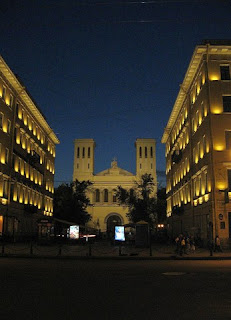 The view is still damn good, but seeing the change would have been perfection. The only solution is to cross back and join the other group in our first St Petersburg nightclub. The nightclub is a converted classic building complete with marble staircase and lush, indulgent foyer. Outside Don has scaled the wall to leave the painting he bought at the Hermitage on one of the huge window sills. He figures this means it won’t get damaged inside. I’m watching the group of bemused Russians who watch him do it and place a private one shot of vodka bet that it won’t be there when we come out. Don and I find some vodka shots, toast St Petersburg and wonder where the night will take us. All four of us churn through the introductions to the changed group of couchsurfers and friends and exchange short chats in-between the loud music coming from the dancefloor.
 Don and I are watching one girl who is easily one of the most natural and sensual dancers either of us has ever seen. We are both veterans of many music, dance and trance festivals and have seen our share of amazing dancers. The way this girl moves is at once completely self aware, but without a trace of being self conscious. She moves as an integral part of the music, not with it or around it. She also broadcasts a confident sexual awareness that has every man in a ten metre radius absolutely enraptured; and she lives and loves every moment of it.
“I’m not going to talk to the dancing girl. I just can’t fall in love again in this country. Today”, Don says with absolute certainty.
We’re talking about how we can find out where she learned to do that, and meet her, when one of the Germans taps us on the shoulder and says,
“Your friends are outside and can’t get back in”.
We look at each other and out the door, where they are sitting on the marble staircase looking bored. Apparently they went outside for a smoke and the bouncers want to charge them entry again. We elect to have one more vodka and then discuss whether we should stay here and get onto the dancefloor or follow them. We watch the magical dancer feel her way through another song, which pretty well makes up our minds. Then I receive a message on my mobile from Lari telling me about the café they’ve moved to. We decide we will follow the Germans to another club, but will find the girls first and see if they want to come along.
 Don scampers up the wall outside, his long hair flying about him as he jumps back to the ground clutching his picture. We slope through the busy streets to find the girls at another covered gazebo style café drinking coffee. I order a bottle of champagne and we sit down to enjoy a calm moment in the night. That bottle is definitely a mistake. From the point of leaving the café after an hour or so, things are very fuzzy and indistinct. I make them all stand for a photo pose outside after we leave. It takes me a dozen attempts to get a focussed picture with an autofocus camera. The sun is already lighting the sky when we decide to separate, or more accurately the girls leave us to head for the train station. Don and I make a solemn vow to find the second nightclub. We bid them farewell and march off with arms around each other’s shoulders enjoying the night. This is the first time we two brothers have been together in the same place at the same time for a long time. We live in cities a few thousand kilometres apart now, so chances to meet are rare and to be savoured. We both knew extreme intoxication was inevitable, even though we also knew this was a bad idea in a foreign country where we don’t speak the language. Don scampers up the wall outside, his long hair flying about him as he jumps back to the ground clutching his picture. We slope through the busy streets to find the girls at another covered gazebo style café drinking coffee. I order a bottle of champagne and we sit down to enjoy a calm moment in the night. That bottle is definitely a mistake. From the point of leaving the café after an hour or so, things are very fuzzy and indistinct. I make them all stand for a photo pose outside after we leave. It takes me a dozen attempts to get a focussed picture with an autofocus camera. The sun is already lighting the sky when we decide to separate, or more accurately the girls leave us to head for the train station. Don and I make a solemn vow to find the second nightclub. We bid them farewell and march off with arms around each other’s shoulders enjoying the night. This is the first time we two brothers have been together in the same place at the same time for a long time. We live in cities a few thousand kilometres apart now, so chances to meet are rare and to be savoured. We both knew extreme intoxication was inevitable, even though we also knew this was a bad idea in a foreign country where we don’t speak the language.
  We spend the next half hour lurching up a canal while receiving directions on our mobiles from the German guy. His girlfriend has gone home now, but he’s still out enjoying further refreshment. We make it to the construction site he had been trying to get us to find and round the corner to see him standing looking exactly how we felt – muntered. His face droops and his speech slurs badly as he lets us know he had just been on his way home. Meeting us changes his mind and he accompanies us back into the club. It has a beautiful wooden interior spread over a couple of rooms and a balcony through huge French windows. It has floor standing candelabras that reach above our heads and the bartenders have no problems supplying more vodka to a trio of inveterate troublemakers. I remember talking to different people who seem amazed that I’m Australian and standing in this club. I even remember going rounds with Don ordering vodka shots – four at a time. I also take a moment to buy another round of two shots to pay my private bet about him losing the picture; he still has it under his arm. The sun is well and truly up by now and streaming in through those windows. Our German friend leaves us and we last one more round before deciding we had better head for home before real trouble comes our way. We spend the next half hour lurching up a canal while receiving directions on our mobiles from the German guy. His girlfriend has gone home now, but he’s still out enjoying further refreshment. We make it to the construction site he had been trying to get us to find and round the corner to see him standing looking exactly how we felt – muntered. His face droops and his speech slurs badly as he lets us know he had just been on his way home. Meeting us changes his mind and he accompanies us back into the club. It has a beautiful wooden interior spread over a couple of rooms and a balcony through huge French windows. It has floor standing candelabras that reach above our heads and the bartenders have no problems supplying more vodka to a trio of inveterate troublemakers. I remember talking to different people who seem amazed that I’m Australian and standing in this club. I even remember going rounds with Don ordering vodka shots – four at a time. I also take a moment to buy another round of two shots to pay my private bet about him losing the picture; he still has it under his arm. The sun is well and truly up by now and streaming in through those windows. Our German friend leaves us and we last one more round before deciding we had better head for home before real trouble comes our way.
 We stagger out of the club around six in the morning to be greeted with an overwhelming sight. The Cathedral on Spilled Blood, St Petersburg’s answer to St Basil’s cathedral in Moscow, is directly in front of us across the canal. Its appearance arrives as an invigorating revelation to our sodden brains. Somehow we had completely failed to notice this incredible building on our way in. Our cameras come out and we both try to capture the arresting beauty of the colourful onion domes of the cathedral shining in the dawn light. Which is when the two policemen arrive and ask for our passports. We comply as best we can, slowly and with long pauses to open money belts, as we explain we’re trying to get to the metro station. When they discover we’re Australian, they tell us to go home straight away. We agree completely and stand confused for a minute as they walk off, feeling particularly lucky that they let us go so easily. We had both heard stories of visitors to Russia spending time in a lockup or spending money to avoid that threat, or both. Feeling a new urge to return home we make it to a Metro station in record time.
 I’m standing on the platform ready to catch the next train when I notice Don is no longer with me. He is well known for wandering off randomly and at this time of morning I’m fading fast and can’t find him anywhere on the platform. I decide I’m angling for home and keep my mobile in my hand in case he calls on the way. I’m standing on the platform ready to catch the next train when I notice Don is no longer with me. He is well known for wandering off randomly and at this time of morning I’m fading fast and can’t find him anywhere on the platform. I decide I’m angling for home and keep my mobile in my hand in case he calls on the way.
I lurch out of Alisha’s train station and onto the open square in front of it that leads to the marshrutka waiting zone when two policemen bail me up. I’m unable to actually walk standing straight up at this point and I’m leaning heavily to one side, which is seriously hurting my lower back as I try to straighten up. I’m guessing this is what alerted the wise detectives to my condition. They stand evenly either side of me, both facing me on an angle, and demand my passport. I’m feeling a lot less confident than the previous encounter; I’ve lost Don and probably used up my luck in dealing with the Russian authorities. The pair of them are looking particularly severe as I pass it to them, wondering what I would need to be allowed to continue my reckless rampage.
“You’re Australian?” The first man exclaims to me in Russian, a broad smile covering his face.
“Yes, I’m an Australian man”, I manage to reply in Russian.
It sounded good to me at the time and he seems to understand. He passes my passport to his friend and both of them are now smiling broadly at me. It occurs to me how much of a typical Australian yobbo I’m being. My inner lesbians have utterly deserted me in disgust. Here I am in a very foreign country on a trip I’ve been planning for a couple of years and it’s only taken two weeks to land myself fiendishly drunk in a discussion with some police officers about the situation. I suppose I must be grinning like an idiot back at them by now and I have no idea what to do next. They also don’t say anything I can understand. I decide they must want something from me and enter a strange charade of emptying my pockets and handing stuff to them. Each guy looks at it, passes it to their friend and then passes it back to me. I can remember seeing the huge smile on the face of one of them as he opens my wallet and shows me the roubles left inside it, before handing it back to me again. They ask me where I’m going and I point at the marshrutka queue and struggle to remember how to say “123” in Russian. I settle at pointing at the one I need and say,
“That one”, repeatedly, in Russian.
They step out of my way, hand me my passport and tell me to go home straight away. Not believing my luck, I do exactly that and arrive at the apartment just half an hour after Lari and Alisha. I tell them about the policemen, much to Alisha’s amazement and Lari’s horror, before I have another cold shower and pass out.
Since before the mighty Qin emperor united China into one nation for the first time, the people have quested to find one thing above all others from the natural world; the secret to immortality. Qin Shi Huangdi himself is likely to have died from eating mercury tablets given to him as immortality pills. The stories, legends and myths in Chinese culture that centre around Taoists who attain immortality are almost numberless. It’s a strong drive that lives on today in the second answer to any question; it’s for good health. Good health means long life and the longest life is immortality – which you should be striving for in every waking moment that you aren’t striving for good fortune.
This brings me inevitably to the topic of Chinese food – the heartland of the ‘good health’ culture. In general mainland Chinese food has a few common characteristics. Firstly it is incredibly oily. Seriously, every Chinese recipe starts with this instruction,
“Half fill a pot with oil so you have somewhere to cook everything.”
I had Chinese people telling me that a dish wasn’t that oily, or wasn’t oily at all. This meant that there was one tablespoon of oil to every three tablespoons of actual food, rather than the one to two ratio they prefer. Don’t even bother trying to explain how incredibly unhealthy that much oil is in your diet. The chinese people say it’s great for ‘good health’ and you and the food scientists are NOT an authority.
Secondly ingredients are given the minimum preparation possible. You take fresh stuff, maybe cut some of it up, probably leave most of it whole and throw it in the oil bath. If you’re making Szechuan food, you chuck in the peppercorns and chilli. Otherwise it’s a mix of simple sauces and probably cornflour to make it thick and slimy. Now the fresh ingredients part really is good and it’s taken very seriously. If vegetables don’t have the right texture associated with freshness, they will stop eating it and never return to the restaurant. If it isn’t fresh, it isn’t a part of ‘good health’. The fact it’s covered in enough oil to clog the arteries of a rhinoceros is apparently irrelevant.
While we’re talking about texture, that is a general point about all Chinese food – the texture is as, or more, important than flavour or taste. There are particular textures the Chinese palate craves; crunchy fresh for vegetables, crispy chew for animal skin and super smooth and soft for everything else. That’s why the cornflour gets into so many sauces, it makes the sauce smooth and soft, instead of watery. Chinese desserts are an experience in weird mouth sensations for westerners. Quite a few felt like I was chewing giant maggots. They had exactly the softness and smoothness you would expect if you ate a maggot. Not the best image for food, but don’t ever forget, all of that isn’t a matter of cultural taste, it’s for good health.
Thirdly, all food should be washed down with hot drinks, preferably tea. This is half the reason that you often can’t find a cold drink in a small restaurant or shop. Especially beer. Only crazy westerners ask for cold drinks. It’s good health to drink warm or hot drinks, you must be crazy to drink cold drinks – you will definitely shorten your life. Frankly, warm beer already shortens my life. Now considering the amount of oil in the food, drinking hot tea with it actually makes sense. The oil floats above the food itself and doesn’t get a chance to form into a single lump that could probably choke your intestines for weeks. Now if you ask anyone about any part of this, the answer you are most likely to receive is, ‘it’s for good health’. I hope it’s starting to drive you as crazy as it drove me.
I remember sitting in a restaurant being lectured by a middle-aged Chinese man on good health. This was one of many times the topic came up, but this time illustrates the culture best. He thought I should be drinking hot tea instead of cold beer and that I should eat less meat – because meat makes you put on weight. I should also eat sunflower seeds and nuts all day long before eating as much rice as I wanted. All of this was delivered whilst he chain smoked his way through half a packet of cigarettes, with smoke drawn through shattered teeth and bleeding gums. This was occasionally washed away as he emptied another glass of baijiu (Chinese sake) that was poured for him at his table. Naturally I tried to explain that carbohydrates have twice the calories by weight of protein and protein actually makes you feel full, so you eat less. Beer has a fraction of the alcohol of white spirits, especially the vile baijiu that routinely was of very low quality – I’m amazed people can see or walk after drinking much of it. That and he was doing more bad to himself with the cigarettes than anything I was doing put together. I was basically told to shut up, because I was younger and hence wrong. If I listened to him, I would enjoy good health into my old age. I looked into that destroyed mouth one last time and vowed to ignore advice from manky old Chinese men.
I was surprised and a little disappointed to see advertisements on Chinese television for products that have been banned in Australia, England, North America and Europe for twenty years. This included weight loss or long life tea, slimming magnets and any number of things that were guaranteed to give you good health and long life – but not much more. Just profits for the company selling it really. False advertising legislation seems to be absent from Chinese law – or the advertisers have enough guanxi with the government to render it pointless. It seems Chinese marketers have long understood the people’s weakness for anything labelled with ‘good health’ and aren’t afraid to prey on it.
You’ll see people walking down a pathway in a park clapping their hands above their heads. You’ll watch them eat foul tasting ingredients with a grimace on their face. You’ll see them choose one side of the street to walk down or some kind of car to drive. All in the name of ‘good health’. I developed theory on this that says if you want to sell something or mess with the Chinese people all you need to do is find someone with a lot of guanxi and get them to spread the word. You could start a trend, sell a product or just have fun and nobody would question it for a moment. They’d wear one red sock on their left hand if someone in a position of authority said it would bring good health or good fortune – and did it as an example.
That culture of being forced to listen to and obey people in higher social positions creates this crazy dichotomy of a ‘good health’ culture tainted with incredibly unhealthy habits. It was with some delight I noted that the current generation of twenty-somethings seems happier to ignore their ancestors and look to science for real answers. When they’re in front of their elders, they generally conform, the moment they’re away, they make their own choices. There’s nothing wrong with a culture of good health, just make sure what you’re doing really is healthy. That way you avoid swallowing immortality pills and dying of mercury poisoning like old Qin Shi Huangdi.
So a number of people have asked me about what the Chinese people are like and later asked what’s the difference between people from mainland China, Hong Kong and Taiwan. So I’m going to write a few entries now to give my definitive answer after long hours of consideration. It can, however, be condensed into one sentence: They’re all fucking crazy, but in an interesting way I kinda respect. So first here’s a summary of the character of the average mainlander. Of course this is a generalisation, but you’d be surprised how well generalisations actually work here.
When asked why they are doing anything at all, there are three standard answers you will receive 99% of the time. These activities can range from eating chicken feet, lighting incense in a Buddhist temple, carrying a live pig on a motorcycle or drinking three litres of tea every day. These answers are (in order of greatest usage):
1. Good fortune
2. Good health
3. I don’t know
It never ceased to amaze me how much the first two answers govern the vast majority of daily behaviour. They seem to form the common basis of all shared understanding between the Chinese people. If you cannot track back everything you do for every moment of your life (including sleeping time) to one of those two things; then you are weird. For example, every time I explained that I had quit my very well paying job to go travelling for an indeterminate length of time with no particular goal in mind apart from increasing my life experience; they would pull a very baffled expression. The idea of leaving any work is simply unthinkable. The idea of leaving such good work is beyond rational comprehension. Okay, so people back in Australia also may not entirely understand the decision, but it’s not that unfamiliar. The dream of leaving work and doing something else is such a common one, that incomprehension is more normally replaced with jealousy.
So now we’ve introduced good fortune, let’s go into that a bit more. So, by good fortune I don’t mean jumping onto a train just before it leaves or meeting an old friend unexpectedly. I mean money. Pure and simple. The Chinese pursuit of money is already famous enough, being in the heartland took it to a new level of insanity for me. You can argue that it’s a hangover from days of starvation and abject poverty that were not so long ago and I’d agree. Here are a people who will argue for half an hour over the equivalent of about twenty Australian cents. It’s not that it’s worth that much, you would need three times as much to buy a softdrink. It’s just so ingrained in their culture to preserve money above all else, that it would be unthinkable to let it go. After I was there for over three months, I found myself having exactly the same argument with a drinks vendor for exactly that amount of money. It wasn’t that I cared about the money, I just felt I was being ripped off and that is the clue to the Chinese state of mind. When resources are in short supply, everyone is a penny pinching businessman.
When I spoke to a Taiwanese woman late in my trip, she made it even clearer. She explained she didn’t like travelling in mainland China because she permanently felt like she was being ripped off. She could never get the ‘best price’ because she wasn’t a local – they could tell she was from Taiwan by her accent. I asked her what she thought it was like to have white skin and not speak Chinese in terms of getting a good price and she laughed and told me proudly that I would pay a lot more than her. It’s all about getting the deal, a better deal than anyone else you meet. People who are able to find these better deals are held in very high regard. When I told her I’d managed to get a three star hotel room in Jinghong for just forty kuai (just under AUD$7) because I was travelling with a Chinese mother and daughter from Kunming, she was impressed with my using a local connection to get the best deal. She immediately wanted to know how I knew them and if she could get to know them too, since she had been thinking of visiting Yunnan province.
Now this leads me to talk about guanxi (goo-wan-shee) and its relation to good fortune. Guanxi describes relationships between people, in particular where favours can be asked or demanded from someone. Having these connections is a kind of social capital and a person with powerful connections is in high demand and ranks very highly in the social structure. Many disagreements that in Australia are resolved in lower courts are resolved by a guanxi battle in China. The discussion has nothing to do with the merit of solutions to the conflict, just that one person can establish a higher or stronger level of influence. For instance, an argument my mate in Shanghai was having with a noisy neighbour ended up being resolved in one phonecall from his office manager with serious military connections. The dispute had been festering for a while until guanxi made it clear who would win. I was told in car accidents, the dispute is often resolved the same way. So having ‘good guanxi’ is a sure indicator of good fortune, since it means you don’t have to waste time arguing with people; you just establish your superiority. Having friends in high places in China really is a free ride ticket to the easy life.
Now back to the pursuit of money, where it took on a particularly ugly form for me in Chinese Buddhist temples. Sure you need some donations for the upkeep of the buildings and welfare of the monks. However, the way they’ve turned what should be part of a religious experience into a strictly commercial transaction is disturbing and wrong. The people arrive at the temple and spend about twenty minutes moving from altar to altar doing the standard kowtowing that always finishes with money going into the box. I happened to be in a larger temple in Chengdu when they were emptying the boxes for the day. The sack of money the two monks were carrying around grew so quickly that after the third altar they had to find a hand trolley to shift it to the next one. I did some quick calculations and figured their take must have been in the order of 5-10,000 kuai – about AUD$1000-$2000. That is a lot more than a monthly wage for a Chinese worker. If they’re collecting that daily, I cannot understand what it’s being spent on. I know it’s got little to do with building maintenance and construction, local businessmen pay for that separately in large scale public donations to increase their status. Nobody questions this of course. Giving money to the temple gives you good fortune. You’re crazy not to do it.
So while we’re on the topic of the Chinese and religion I’d like to pass on my observation. There are no religious Chinese people. If there are, they are safely locked away in a monastery or living in a cave somewhere safely out of sight in case more people get the idea. To be fair, I did meet two people who really seemed to care about their spiritual life in more than the surface ritualistic way. They were in a tiny minority. The Chinese are deeply superstitious, but in terms of religion they match Australians, Canadians, French and English for sheer atheistm camouflaged by the occasional appearance of religious intent. Sure the Chinese people are much more likely to be found in a temple offering incense (bought at the temple for a price), but the religious practice starts and stops there. The idea of personal enlightenment leading to some kind of inner peace that does not require material goods or wordly interests is insane to them. They understand the idea as much as your average Australian and dismiss it as the preserve of freakish fringe dwellers like monks. However, Chinese monks spend their time chasing money just as much as the next guy. I saw them with begging bowls in the street, not asking for food – but strictly cash donations.
I also saw and spoke to more than one person who saw absolutely no problem with burning incense at a Buddhist temple, before striking the bell and drum at a Taoist temple, then a quick prayer in a Christian church before finishing it off with offering more incense to your ancestors. Surely doing this in more places will bring you more good fortune? Chinese superstition, however, is profound. There are auspicious days to do anything – and you must consult before you take any action. This means you pay money to someone to have a quick look for you. Everyone knows about Feng Shui now, it’s still taken very seriously by the majority of the population. You have to put coins in red bags, buy lucky charms in temples and a thousand other things to satisfy this superstitious drive. The superstition is all neatly bundled under the standard answer, ‘for good fortune’.
The river side of the Winter Palace and Hermitage: The correct side to enter from.
Nobody gets out of bed until around eleven, it’s a rainy day and that helps us all enjoy the extra sleep. We decided that the Hermitage would be the place to visit today, but now we will only have a few hours to explore something that friends have advised me to spend a few days visiting. The Hermitage is the truly amazing and extensive art gallery and museum that resides in two adjoining buildings; the old Winter Palace and the Hermitage itself. The three of us head for the city whilst Alisha makes for work to try and finish something off before meeting us for dinner. The journey into the city doesn’t take long and we find ourselves approaching the Winter Palace filled with anticipation of the experience.
I’m staring at the strangest statue atop an enormous column in the middle of Palace Square. It’s an angel carrying an enormous cross, but it appears to have no head. Who would build a headless angel memorial? What significance that could possibly have? I’ve never heard of this before in any kind of icon Maybe it’s some saint who got beheaded while….ummm…carrying a huge cross. Okay, maybe not. Maybe it’s some Russian Orthodox symbolism at work, who needs a head when you’ve got faith? I’m almost disappointed when we move past it walking towards the Hermitage entrance and the head appears, bowed deeply. Apparently this forty-seven metre tall, six hundred tonne monolith was the largest free standing monument in the world for some time and probably still is the largest one carved from stone. It was placed there after the Napoleonic wars as a ‘gift’ from the Russian people to the Tsar Alexander I. More recently this square also heralded the start of the 1917 revolution. The storming of the Winter Palace marked the first of ‘Seven Days that Changed the World’ as the famous book puts it. However, there’s no reminder of that history standing here in Palace square. The huge mobs of hungry Russian peasants and workers are replaced with throngs of tourists and locals surging around the Hermitage entrance. A few young people have set up easels and are painting the square from different views while another couple are dressed as Peter the Great and his wife to hustle tourists for the photo opportunity. We move to join the queue of people buying tickets.
 If you arrive on a sleigh, you skip the queue.
Russia has long been known for its sporting prowess, but there are some sports that have been overlooked by the outside world for too long. It’s time to cast a light on the true Russian national sport; queuing. They love it, they’re bloody good at it and they take every opportunity to practice a little. I think if three Russians stand in a line, more will join instinctively to have a chance to receive whatever is at the end of it. I think Australia had better start funding our athletes before this quiet sport takes over the world by storm. The queue here is about three or four people wide and moving very slowly as each small group passes into the building and the ticket office inside. After about forty minutes of training to make the first Australian entry to the Russian national sporting festival, we finally make it to the door. Having waited another few minutes to actually pass through the hallowed gateway, we’re inside the building with just ten more metres to reach the end of the event at the two ticket windows.
I then notice another ‘Kassa’ sign that suggests if I leave the queue and venture ten metres in a different direction, there are two separate ticket offices. I ponder this for a while. Why would everyone queue only for the two visible ones? Why was no-one else even walking over to check the validity of this sign? Surely the other two windows would be closed in line with the well established Russian principles of customer service:
1. There cannot be enough people serving. There can be enough serving windows, but they should be largely closed.
2. The transaction process must be difficult and should preferably involve some form to be filled in with a pen.
3. There must be insatiable demand for any service provided combined with a complete lack of desire on the part of the workers to perform the service.
I’m with Don and Lari, so I take the crazy leap of faith and walk around the corner expecting confirmation of the principles. I find two perfectly operational ticket windows with just a few people waiting at each one. I read the signs to see if these are special purpose windows, I was already familiar with that trick of Russian service by now. They will place a decoy window with someone doing nothing behind it. You can only do one thing at this window, but whatever that one thing is, it will not be what you want and they will be unable to do anything else under any circumstances. However, that isn’t true here; they are absolutely identical to the other windows in every way. Well, except for one small detail; they lack the hundred and fifty odd people waiting to use them.
 This is when I notice that people entering from the river side are just strolling up to these windows, joining the very short queue and getting tickets very quickly. Filled with rage at my own stupidity in succumbing to the herd mentality, I quickly apprise my friends of the situation and we skip around the corner to get our tickets in less than two minutes. I now understand that waiting for the train tickets to be delivered yesterday was simply another aspect of the Russian training program for this new event. There are also summer and winter variations of the gentle sport of queueing; sweating and freezing. Myself and my two friends are now, I think, at the top of the amateur league in queuing Russian style; but only in the summer sport. I’m seeking a government grant to revisit in winter to continue my training; after all, Australians have to be the very best in every sport
 These fun preliminaries aside, we ditch our bags and head to join the tour of the diamond exhibition that’s currently open. This involves an English speaking guide showing us through a special, heavily guarded, part of the Hermitage that holds…..well…. a lot of diamonds. It comprises a host of bejewelled gifts for the imperial family from a number of countries as well as some of their more expensive personal trinkets. It includes some paper thin crafted gold jewellery that I’ve never seen equalled before, along with beautifully sculptured metalwork with fine filigree details of grape vines and fruit. The presents from Iranian royalty are the most exquisitely extravagant. Swords encrusted with precious gemstones and diamonds, whole outfits threaded with gold and gemstones that are all overwhelming. The exhibition is truly beautiful and I’m sure inconceivably priceless.
Alexander the Grouse fighting them damn Persians
After exiting from the onslaught of riches, we decide that the best approach to our short time inside the Hermitage will be to try and enjoy every room in the Winter Palace and try to visit as much as we can elsewhere. This begins an almost timeless afternoon where the three of us separate and rejoin randomly over time. Don disappears while we’re exploring a room full of white marble statues and Lari and I don’t even notice for three more rooms. Each room absorbs your attention quietly and divinely. In one room a finely detailed silver partridge sits in an equally detailed tree inside a metal cage. Another room has been painted with hundreds of frescoed stories in the style of a similar room in the Vatican.
 It was apparently created as a competition piece. We pose with statues, form a dancing procession on a staircase and duck and weave through the busy throngs of people. Lari and I find Don somewhere later babbling about a throne room. We haven’t seen it, so the three of us spend our time looking for it again in-between the corridors and rooms filled with tapestry and paintings, statues and lamplights, crystal, wood, malachite and marble.
 Thrones and fabulous marble staircases feature more than once and it’s during this whirlwind tour I appreciate more and more what my other friends had meant by spending more time. It’s possible to fly through most of the rooms of the hermitage buildings and the winter palace in the space of a few hours, but there are so many places you could happily stay and savour for days. This is especially true during summer with natural light playing across the wooden floors, furniture and rooms. Once again I feel I would have to learn to paint to capture anything of the spirit of this city, I don’t think photographs can ever make it feel the same.
I’m not a pheasant plucker, I’m a pheasant plucker’s wife. I’m only plucking pheasants it’s a pheasant plucking life.
 A voice announces that the Hermitage is closing while we’re busy making a pass through the galleries of past masters and then more modern offerings. Perhaps the speed of our visit made me miss things, but the only art on display that really captured me was a wooden sculpture of a woman falling off a chair. The clash of bodies in motion set into permanent suspension by the wood is an addictive revelation. A voice announces that the Hermitage is closing while we’re busy making a pass through the galleries of past masters and then more modern offerings. Perhaps the speed of our visit made me miss things, but the only art on display that really captured me was a wooden sculpture of a woman falling off a chair. The clash of bodies in motion set into permanent suspension by the wood is an addictive revelation.
The detail was perfect and you somehow believed that this unfortunate soul had been transformed into wood by an ancient creature with mystical powers. We are quite lost in the maze of rooms and corridors and end up being herded out by the museum staff, eager to go home themselves. We finally make it back to the familiar opening rooms near the entrance and enjoy passing by the white marble statues before emerging back into normality
Athena with some hot lesbos action
The atmosphere inside the Hermitage certainly feels like some parallel world, even when you can look out of the windows and see the boats on the Neva and people on the street; it still feels separate. I wonder if I’ll get a chance to spend more time in there as I retrieve my jacket and we pause by the souvenir shops. Don ends up buying a framed print of a picture he particularly liked. It’s a rectangle more than half a metre across and half a metre wide that is sure to become an amusing burden. He does always tend to live for the moment and relish them as they flow irrevocably past; life without too much concern for the future. We exit the Hermitage feeling hungry and looking for instant gratification.
I bet she likes to ‘Club the Lobster’ all night long
It’s 1992, you’re in Darwin and it’s after four o’clock on Sunday morning. You’re still going after a night on the piss in town and there’s a few friends with you. There’s two possible places you could be. One is in Squire’s Tavern on Edmunds St right in the city centre. It’s a classic dodgy pub; home to Darwin city’s lowest clientele and too many university students. It’s been there forever and is open 23 hours a day. Well, they have to clean it sometime. The other place is where I am right now and that’s Uncle Sam’s. It’s a 24hr food stop, placed carefully at the corner you have to pass to leave the city going down the highway. Taxis hang around here, because very late on a Friday and Saturday night it’s a standard gathering ground to find something greasy to eat before making the long journey home. Well…it’s Darwin, the longest journey is going to be under twenty minutes in a Taxi, but it never feels that way when you’re there. There’s one last thing you will find here at this time, in fact at most times, and that’s the Uncle Sam’s dude.
Nobody can remember having Uncle Sam’s without him. He’s a fixture you look for and feel somehow reassured when you see his heavily tanned, wrinkled, aged body hunched against the wall, sitting on the ground outside. He’s not begging. He’s not busking. He doesn’t want anything from you at all. He’s just there. Over time we’ve chatted to the staff at ‘Scams, as Uncle Sam’s is affectionately known, and discovered he’s an old homeless guy who has a few kangaroos loose in the top paddock. One night we discover he speaks German and his name is Rudi. This came after another session of listening to him talking randomly at the world. He sits quite calmly talking to nobody with varying levels of volume and passion about…about….well….we never really understand. His voice is deep and carries the accent strongly, but a rational train of thought never becomes clear – unless he’s ordering a coffee from inside or you ask him the time.
In fact, asking him the time becomes a kind of ritual for a small group of us. You ask, and then he spends about a minute withdrawing a broken, bandless wristwatch from the small, black bag he carries with him everywhere. His deep, sonorous voice is like an announcement from the highest authority just for your benefit.
“It’s a quarter to two”, said in his voice, becomes a catchphrase in the group to refer to those moments when you’re drunk and heading for ‘Scams – or as a standard answer when someone asks you the time. Occasionally the staff let us know he’s run out of money and was asking for a coffee – and they’ve already given him a couple. We always find him one. He’s crazy, homeless, harmless and a part of our lives now. Of course we’ll help him out.
Everyone who lived in Darwin at the time knows the Uncle Sam’s dude. And everyone was equally horrified when a group of dumb bogans took it upon themselves to beat him up and put him in hospital. I’m guessing after watching one too many American TV shows, they decided this was somehow appropriate. There were dozens of big guys who wanted to find the ones responsible and put them in hospital next. Rudi must have been in his fifties or sixties, was definitely out of his head, but utterly harmless. Beating him up was an act of sheer cowardice that assaults any Australian’s sense of fairness. It made the local paper. We got the full story from the ‘Scams staff; who had tried to break it up, called the police and helped make some arrests. They also started a collection to help him pay for his treatment and they even visited him a couple of times to make sure he was being looked after.
I don’t remember when I stopped seeing the Uncle Sam’s dude around town. He did return after he recovered, but I don’t know what happened to him later. Given his age, he’s probably passed on now to go hang around the great ‘Scams in the sky. Rest in Peace Rudi. We remember you.
Filled with the kind of overwhelming happiness that only comes from the depths of utter despair, we finish our drinks and surge into the street to begin our journey into the city to discover this Russian pub they call Tolsti Fraer. After the heavy tension of the last couple of hours waiting for the tickets, we begin to relax to our normal level of banter and commentary on the surroundings. The hour trip seems to last just a few minutes and suddenly we arrive to see Elena (another local couchsurfer) waiting near the door. She arranges a table for us and we order some of the beers that this chain pub brews. With your first half litre glass you receive a plate of Russian drinking food. This is a couple of types of hard bread, some dried fish and some salty pretzel sticks served on a small bread plate. We enjoy the novelty value of new nibbly food and order some plates of different Russian sausages and side dishes to try everything. Elena is helping us a lot here with ordering and then Alisha arrives, relieved to be able to relax after her week at work. She quickly arranges herself a beer and her smile grows wider with every sip.
 You hungry dude?
 The beer flows freely and I ask why there’s a mannequin of a guy sitting at a piano in the corner. Apparently he is who the pub is named after. I offer him a piece of the sausage, but he doesn’t seem hungry. Once everyone had eaten, myself Don and Lari pick up the bill (against Alisha and Elena’s objections) and we all agree to go for a stroll through the city. We cross back past the Natural History Museum and walk along past the Naval Museum. It’s just before sunset and the fountains are firing up in time with the huge soundsystem placed in the gardens in front of the Naval Museum. We hear a loud, booming sound and wonder if something bad is happening. Thoughts of Chechen rebels fade as we notice a man with a small, modern looking artillery cannon charging two hundred roubles (AUD$10) a shot to launch fireworks from it. The charge flies out of the cannon and then explodes in the air about 20 metres away. That’s too much for Don, who races over to have a go. He has to put on a metal helmet and poses as we appreciate his pyromaniacal instincts at work. He giggles as the firework explodes, immensely pleased with his effort and we keep heading around the SS Peter and Paul fortress. Alisha and Elena disappear for a few minutes and then return saying they now have supplies for us to visit the beach with. The beer flows freely and I ask why there’s a mannequin of a guy sitting at a piano in the corner. Apparently he is who the pub is named after. I offer him a piece of the sausage, but he doesn’t seem hungry. Once everyone had eaten, myself Don and Lari pick up the bill (against Alisha and Elena’s objections) and we all agree to go for a stroll through the city. We cross back past the Natural History Museum and walk along past the Naval Museum. It’s just before sunset and the fountains are firing up in time with the huge soundsystem placed in the gardens in front of the Naval Museum. We hear a loud, booming sound and wonder if something bad is happening. Thoughts of Chechen rebels fade as we notice a man with a small, modern looking artillery cannon charging two hundred roubles (AUD$10) a shot to launch fireworks from it. The charge flies out of the cannon and then explodes in the air about 20 metres away. That’s too much for Don, who races over to have a go. He has to put on a metal helmet and poses as we appreciate his pyromaniacal instincts at work. He giggles as the firework explodes, immensely pleased with his effort and we keep heading around the SS Peter and Paul fortress. Alisha and Elena disappear for a few minutes and then return saying they now have supplies for us to visit the beach with.
 Alisha with her Winter Palace
We settle down on the beach in front of the fortress to enjoy the slow sunset with the view across the Neva River of the Winter Palace and surrounding buildings. Yes, there really is a beach in the middle of St Petersburg and it’s quite crowded now. Elena produces a series of beers from her bag and we have one or two as we chat. As I sit on the beach enjoying the feel of the sand in my fingers and the constantly shifting golden light reflecting on the calm river waters, I wish this feeling could last forever. Utterly content to merge into the sand I feel the weight of the world slip away from me. The beers are certainly helping this, but here I am sitting on a beach in northern Russia sipping beers with a couple of locals and two old friends. The beauty of the scene mixes with the feeling of friendship to create an afternoon of warm happiness in St Petersburg.
Beachy Goodness
Everyone is herded off the beach around eleven o’clock as they close down the fortress for the evening. We amble around the edge of the park towards a Metro station, enjoying the very last of the sunlight. Elena wants to know if we’d like to stay out and go to clubs and see the bridges rise in the early morning. A few other couchsurfers have already said they’ll be out tomorrow, Saturday, night and we’re planning to join them. Don is still tired from the train trip from Moscow as well, so we make use of the Russian people’s taxi service to get home with Alisha before the bridges rise.
“If I lived in St Petersburg”, I begin once we’re all at home enjoying a nightcap,
”I would have to take up painting to try and capture the ebbs and flows of the city’s moods.”
Indeed, it’s quite a common sight to see people all over the city with easels arranged and brushes at work doing exactly that.
“I like to draw scenes here myself”, Alisha reveals.
“Really, do you have some you’ve done here now?” I ask, fascinated at a new part of my host’s already delightful character.
“yes…oh..in here”, she mumbles; searching her desk for the scrapbook.
It is filled with an array of scenes of people and places, facades of buildings and faces captured in time. She has a straightforward but emotive style I enjoy and we spend time turning through the pages as she explains pictures to me with the self-conscious reservation of a nervous artist revealing their work.
“These are great; you should be doing more of them!”, I finally entreat.
“Maybe….. I like to do them. I’ll make you one before you go, maybe I will have time”, she offers wistfully.
I decide not to push her anymore and hope she really will have time to make one.

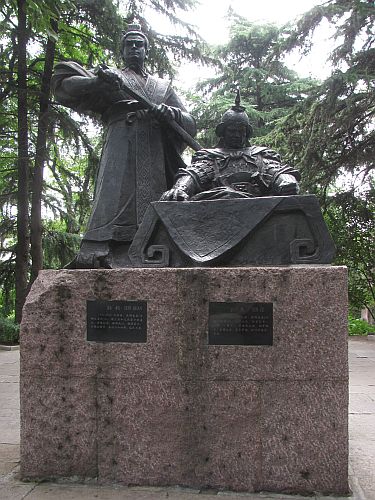 Sun Quan and Sun Ce So let’s meet the Wus. Actually Wu is just the name of the kingdom that they form in the southern part of the Han empire. The real surname to watch is Sun (pronounced Soon, but quickly). Sun Ce (pronounced Tser) is the ruler of the area when the book starts, it passes to Sun Quan (pronounced chew-an) who is the main man for most of the book. Sun Quan has some brilliant generals, some fantastic advisors and he himself is one smart cookie. His problem his he never makes up his mind whether he wants to defeat Cao Cao and prevent him from usurping the throne, or actively help him usurp the throne, or just sit down in the south and let the Wei and Shu Kingdoms fight it out then deal with the winner. He does all of these things and manages in the end to nobble the Shu kingdom utterly by killing Guan Yu and taking his lands, but just twenty years later the Wu kingdom (led by Sun Quan’s son) is a vassal under the Jin Dynasty. Sun Quan never seems to want the emperor position for himself and there’s quite a few times when you get the feeling he’s just getting by standing his ground; wishing he was spending more time relaxing.
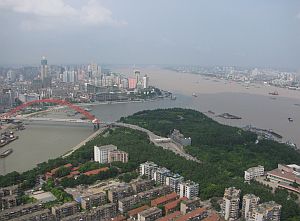 View from the TV tower in Hanyang: That's Hankou on the left and Wuchang on the right. Yangtze river on the right, Han river on the left. You have to respect him for his efforts, he never loses his kingdom; but I end up hating him for screwing up Zhuge Liang’s plans. If Sun Quan hadn’t killed Guan Yu when he did, he never would have. The Wei kingdom would have fallen to Shu in another five or ten years and Zhuge Liang would have left a frickin amazing dynasty behind him. So that’s enough of politics from the novel, let’s check in on what’s there today. Wuchang is the capital of the Wu kingdom at the start of the book and today it forms the eastern side of Wuhan, a huge industrial city formed by combing three older towns; Hankou in the north, Wuchang in the east and Hanyang to the south. Nowadays the whole of Wuhan is a tremendous construction zone. The train stations are being extended to build a subway system, they’ve just finished connecting the fast train line from Nanjing, buildings are going up in every direction you care to look and it’s hard to find anywhere quiet. The three towns are separated by the intersection of the Han and Yangtze rivers, that meet almost at right angles in the centre of Wuhan. At that intersection there’s a place called Turtle Mountain. It’s called that because it’s higher than all the surrounding ground and apparently saved the locals from heavy flooding many times. They would all gather on the turtle’s back and wait until the water receded. This isn’t such a big problem nowadays with the Three Gorges Dam controlling the Yangtze river; but it is a cool park with a 280 metre television tower on top of it that you can visit for the view.
 Liu Bei, Guan Yu and Zhang Fei on Turtle Mountain I was well happy to find statues of Three Kingdoms characters placed along the top of the walk along Turtle Mountain, but most surprised to find one of Cao Cao there. In the story he is an outright evil; a Machiavellian, paranoid, devious and self obsessed kinda guy. I couldn’t understand why anyone would build a statue of him; except as an object of disgust on whom you can spit. I did talk to a number of Chinese people about this question and imagine my surprise when I discovered that the communist government really like Cao Cao and are the ones responsible for his promotion. The angle they use is that he was a revolutionary leader, just like them, and he was doing everything to free the Chinese people from the oppression of a corrupt and decadent emperor. Well, he certainly did replace the emperor and Cao Cao was only a megalomaniacal psychopath, so maybe that’s a little better. Oh no hang on… there’s a whole section where Cao Cao disappears into the pleasure palace he builds for himself for half a year or so and does nothing but play with concubines. Nope, he was worse. I’m still amazed they wanted to promote him when they should have been pushing the righteous Liu Bei. In the end Cao Cao does become emperor, so I’m guessing they just want to be seen to be on the winning side.
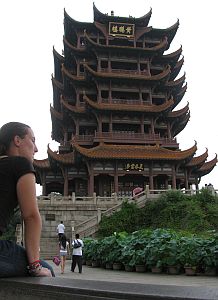 Ines with the Yellow Crane Tower 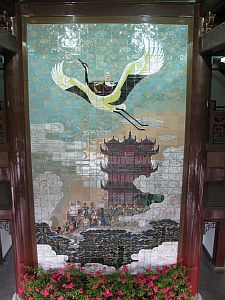 Mosaic in the foyer of the Tower I stayed with a couchsurfing host, a French woman, who teaches way in the south of Hanyang at Jianghan university. I was only planning to stay a few days, but end up being there a week. This is partly because she’s so much fun and partly because it’s university holiday time and she manages to get me my own two bedroom apartment with airconditioning and internet access. It’s an apartment they provide for teachers working there. Best couchsurf ever! Ines has been working for four years now on putting the WOO! into Wuhan. I think it’s worked. She’s always up for a drink and a smoke, a walk and a dance, a talk with some music and definitely a laugh whenever possible. We go to an array of restaurants for Chinese, Uighur, Italian and French food at different times. She also hosts a Kiwi guy, Sam, at the same time, who sleeps on her couch and the three of us have a spectacularly excessive day and night together one Wednesday.
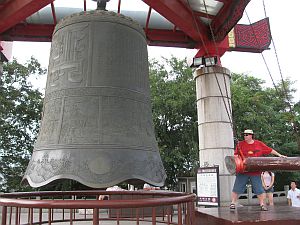 Me earning eternal happiness It all started when she joins Sam and I for a visit to the Yellow Crane tower. The tower has been there a long time and been rebuilt a few times when it burns down. It has always been the symbol of Wuchang and now increasingly of Wuhan. The tower is an interesting place to visit and the view is fantastic, but superseded for me by the enormous bell hanging in a frame behind the tower. For ten yuan you can give it three good bashes with a log conveniently suspended next to it. With each ring the guy next to it yells something out in Chinese that I’m sure guarantees me good fortune, cold beers, eternal life and the polish women’s nymphomaniac netball team will use me as their mascot and sex toy.
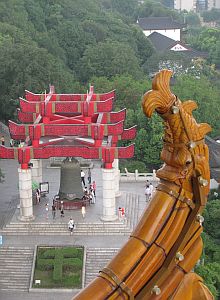 The bells, the bells! We’re feeling hungry by the time we leave the Tower grounds and head for a huge restaurant street to find Drunken Shrimps. Ines tells me about it with a perverse delight, so I have to try it. When we choose a restaurant that can serve it and sit down at one of the huge tables on the street, we have an entertaining time choosing what else to order. None of us speaks or reads much Chinese and the place is very busy and noisy so we’re not sure what to do. Ines then walks around the tables with the waitress pointing at dishes and asking what meat is in them – the limit of her chinese. Doing this she orders up a storm – especially our Drunken Shrimps. To make this dish you take a bowl of watery soy vinegar soup, add a couple of handfuls of small live shrimps and some bean sprouts. Then pour in Baijiu (Chinese sake) and wait for the shrimps to stop thrashing around and die. Then eat them. Wasn’t bad at all. But the dumpling soup or insanely hot slices of chilli beef served cold were probably better.
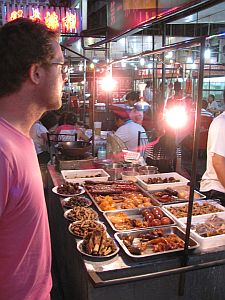 Sam considering dinner options 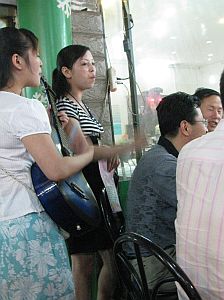 Musicians on the loose!! While we’re eating all that with rice, musicians with an amazing array of instruments come to our table to try and get us to pay for a song or two. Some tables having parties love it and keep them for a while, but most say no; just like us. The quality of the performers is pretty average, but occasionally a real musician floats through and one or two tables in the restaurant pay them for a song. One group is determined to have us foreigners pay and we get auld langsyne and jingle bells played for us. This is despite asking them repeatedly not to. In the end I flip them 20 yuan for the sheer amusement value of having these guys playing traditional Chinese instruments as commercial whores for the foreigners. We stay in the restaurant for ages, enough time to finish off 17 half litre beers between us. This is when a fairly drunk Chinese guy lurches up to the table to welcome us to China and Wuhan. Apparently it’s is birthday and in true Chinese style he’s busy getting mashed. Well, he’s probably had one beer by now. His friends join us as he challenges anyone at the table to finish a whole bottle of beer in a race with him. We resist for a while, then I decide to go for it and we order two new cold beers.
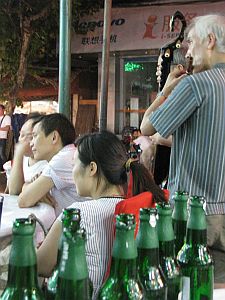 Musicians boring the guy on the next table while we have another beer A crowd gathers around our table and people from the next restaurant stand up and lean in closer forming a couple of rows of spectators watching in awe as we start drinking. We bang down the bottles at the same time, but this is only because he saw me putting mine down and decided to finish to not lose too much face. I point out the centimetre of beer left in his bottle and he demands a new challenge as the crowd laughs and breaks up. Everyone wants to know where I’m from and I happily tell them in Chinese ‘I’m a crazy Australian’. One man gives me a big thumbs up and says,
“That’s very good.”
Before the guy can arrange beers for the new challenge, his last beer kicks in and his friends take him home red faced and burbling. We decide it’s time to hit a nightclub.
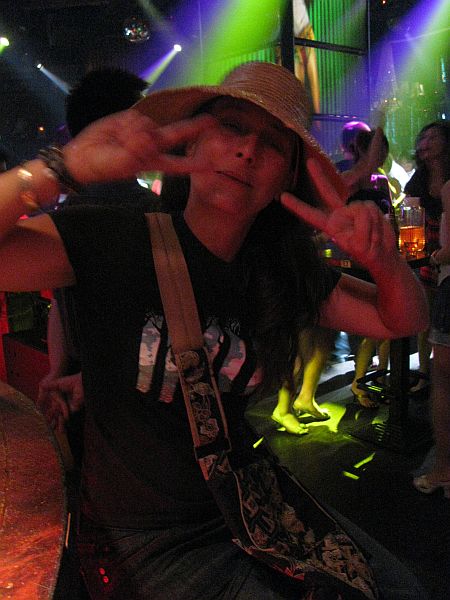 Hot Ines Action Chinese nightclubs have a standard format that never seems to vary around the country. The drinks are incredibly expensive, the beer is always warm and only available six bottles at a time. If you want spirits, you have to buy a whole bottle, which they will happily mix in a jug for you with ice and green tea. The music is mostly recent Chinese pop, with a smattering of American pop from anytime in the last forty years. The décor is the only thing slightly different, but it’s always one large room with blooths around the edges and tables in the middle. Dancefloors seem to be an optional accessory. The one thing I like about their style is that about once an hour live performers will jump onto a small platform and put on a show. It might be one or two dancers or a singer or even a group. They do three or four numbers in different places in the nightclub and give the atmosphere a huge lift everytime.
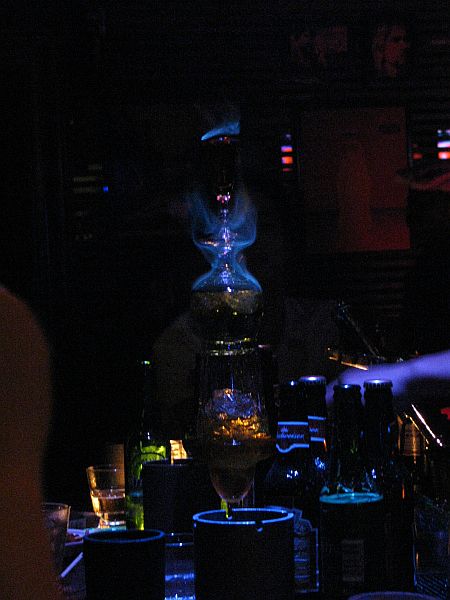 A particularly expensive drink - A cocktail stack. Sam decides the drinks are too expensive and ducks outside to buy some baijiu from a small shop and sneak it into some coke. When he returns I’ve acquired some beers and glasses of coke that he then tops up with the Chinese sake. I have a small mouthful of the resulting mix and it takes a huge force of will over the next ten minutes to not throw up in the middle of the club. This stuff is vile. I know if I even stand up, I’m going to lose dinner and feel greatly relieved when the waves of pressure die down. Thankfully this passes and we get on with a night of increasingly silly dance challenges that culminate in Sam doing worm like manouevres leaning against the bar. He gets bounced and we follow into the night.
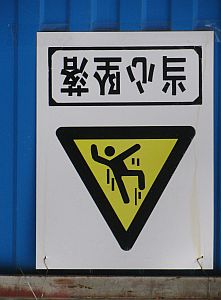 Dance like a madman!! On the way home we discuss the Chinese idea of losing face. This is a primal driver for most locals, gaining and losing face can make or break your life, marriage, career and friendships. Losing control of yourself is bad, having somebody obviously beat you in some social way is worse and having someone lower on the social hierarchy beat you is unthinkably bad. So we start to wonder if you can buy and sell face. How much does it cost to gain face? Is there a sliding scale based on your current and desired position? How do you bargain for this. Can you trade on the face market? If a poor guy with criminal history marries a rich girl from a good family does he gain face, or does she just lose face? Do they meet somewhere inbetween in the face stakes? Can her old man pop out to the local face market and prop up her failing stocks? If somebody finds out that you bought face, do you still gain face? Or lose even more? So if I know that you bought face can I blackmail you over revealing that? And if you make it public and then accuse me, do we both just lose face? Who loses more? We decide we need to form a lobby group to get the Chinese government to form a group to properly explore all these issues.
We finish the night having some beers on the roof of the building we’re staying in while listening to music on my portable music player. The sun appearing in the sky becomes our signal to sleep. I pass out quickly feeling very happy that reading a book has brought me here to have this experience.
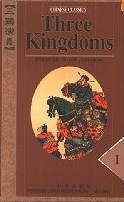 The Romance of the Three Kingdoms The Romance of the Three Kingdoms is one of the four masterpieces of chinese classic literature. Written in the 14th Century by Luo Guanzhong, it is shakespearian in style; telling a story based on real events. It covers the period of time from 169AD to 280AD where the Han Dynasty is failing, the eunuchs holding real power in the court and the emporer being kept ignorant of the reality while he plays with concubines all day. Nice life if you can get it. There are real histories from the time that Luo Guanzhong uses to frame the story and he adds numerous famous poems and songs written in the intervening thousand years. The english translation I read is spectacular. I found it engaging, intriguing and utterly addictive, so many nights I was awake after two in the morning telling myself ‘just one more chapter’. Finishing it inspired me so much that a good part of my time in China was spent visiting places of significance in the story and the tombs and temples of the main characters that exist to this day. I’m just going to assume none of you have ever heard of this amazing book (except from me raving about it), or know anything about it, so in this first part, I need to introduce you to it so when we visit the places later on, I can talk more about what’s there today.
“The empire, long divided, must unite; long united, must divide. Thus it has ever been.”
What a way to start a work like this and when you land in the story the empire is dividing. The book ends with the uniting of the empire and the start of the Jin dynasty. So to give you some idea on why I’ve travelled to these places, I’m going to spend this first entry describing the main characters. First who they are and then a particularly illustrative story from the book, told my way, to give you some idea on what kind of person they are. The opening of the story gives us three of the primary men who are near the centre of almost all the book. Liu Bei, Guan Yu and Zhang Fei. Now, you need to know a little something about chinese names. The first one is always the family name, the second is their given name. All of them have another name, their ‘styled’ name. This is one they choose themselves to further describe to the world who they are, or aspire to be. Some also have a Taoist name, a name in religion as it were. So without further ado, let’s say hello to Liu Bei.
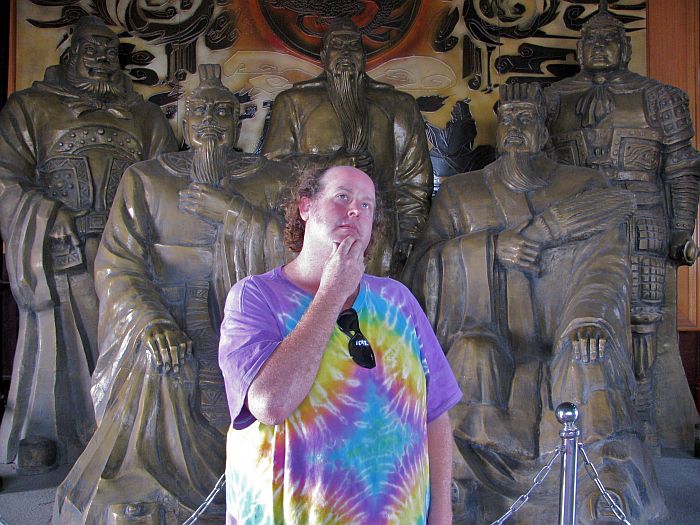 Me and the boys. Zhang Fei, Liu Bei, Guan Yu, Zhuge Liang and Zhao Zilong Liu Bei (pronounced lee-ew bay) styled Xuande (Shu-an-der), is a part of the imperial family. Liu is the surname of every emporer of the Han Dynasty. He is officially declared during the book as the ‘Imperial Uncle’ of the emporer he spends most of his time trying to reinstate to real power. However, his father held no position in court, something that is used against him repeatedly. Xuande means something like ‘proclamation of virtue’ and he does indeed spend far too much time being very nice to everyone. He becomes a very benevolent ruler who spends a lot of his time really caring for his people and threatening to kill himself when they suffer as a result of his actions. This does get on your tits a bit, since if he showed more backbone at several particular moments, the whole history of China would be different. In fact, his close friends and advisors tell him exactly that and prompt him to seek a better strategist advisor; Zhuge Liang.
The story that best shows his character is when he is forced to leave the city of Xinye after repeated attacks by the emporer’s forces under the command of Cao Cao (evil bastard). Despite advice from the incomparable Zhuge Liang and others he does not want to leave his people in the city. The compromise Zhuge Liang proposes is that they post notices telling the people they can move with Liu Bei’s troops or stay in the city and hope for the best. In a testament to their regard for the man, they largely follow. This slows down movement a huge amount and Cao Cao’s forces pursue constantly with the aim to destroy the rebel army. Yeah, Cao Cao should wear a black helmet and have a way deep voice. Liu Bei is advised many times to leave the people and run with the army to the next town. He refuses every time and every time he ends up virtually weeping for his people’s fate. This culminates when the main force of Cao Cao’s army catches them and Liu Bei wants to cut his own head off with a sword; tricky, but impressive if you can do it. He is stopped by Zhang Fei who tells him ‘If you die, none of us can survive’. So a man of the people, but he really loves his comforts when he gets them. He does have a tomb today in Chengdu, but it’s inside the Zhuge Liang temple (Wuhou Ci) to give you some idea on how he’s regarded today.
Guan Yu (Lord Guan in the translation – pronounced Gw-an Yoo), styled Yunchang is a fugitive on the run when we meet him in the first chapter. He killed a bully in his hometown who happened to be rather wealthy and well connected; so leaving is the only option. He is worshipped as the epitome of loyalty, righteousness and the brother you want to have. He is a much better general than Liu Bei or Zhang Fei, wiser, more restrained, but a hopeless politician. His style name means ‘beautiful beard’ and he’s well famous for his long beard and bushy eyebrows. In any statue, you can recognise him because of it. He ends up running the central provinces of the old empire for quite a while, but loses it all to the Wu (southern) kingdom because of his failure as a politician to maintain good relations. He also never picks quality advisors, I think relying on his own abilities above all others. He has two tombs today and a number of temples, the most of any of the characters and more than Zhuge Liang dammit. He has two tombs because his head is in one in Dayang and his body is in the other in Luoyang. Met a nasty end courtesy of the Wu kingdom.
The story that best describes him is after Liu Bei is defeated badly by Cao Cao, they all split up. Guan Yu ends up being taken in by Cao Cao and awarded the title of deputy General in his army. Guany Yu also happens to have both of Liu Bei’s wives under his protection at the time. He makes sure they have their own private quarters in the emperor’s palace and then stands guard himself outside the door most of the time to protect them from any hint of dishonour. He tells Cao Cao that he is waiting only for news of Liu Bei’s wherabouts to rejoin his master. Cao Cao honours him with a huge banquet every few days and a lesser one most days in a hefty bid to win over this incredible general. The moment news arrives, Guan Yu asks to leave and join his master. Cao Cao agrees, but doesn’t bother to tell anybody else about it. Guan Yu leaves immediately with Liu Bei’s wives and then kills most of the guards at a few border crossings on the way, because he does not have official permission to leave. Cao Cao does eventually send a rider with imperial permission for Guan Yu to leave, but he largely discovers the bloodbath left behind. Cao Cao was hoping one of his border guards would kill the pesky general. This is one of his famous moments of absolutely loyalty Guan Yu shows to Liu Bei and a good reason he is still worshipped as a demigod of loyalty and honour.
Zhang Fei, styled Yide, seems to have little history before the events in the book, apart from being a notably good warrior. Yide means something like helping the virtuous, but should mean ‘general pissant’. He is a very good general, with plenty of tricks of his own that he uses to great effect. His problem is when he isn’t being a general in battle, he seems a little lost and repeatedly drinks too much. Whilst he has plenty of respect for his superiors, especially Liu Bei and Guan Yu, he lacks any for his subordinates and routinely punishes them too much – often while drunk. He’s noted for a quick temper and ability to sleep with his eyes open that scares the crap out his subordiantes who think he’s always watching. He often gets a bad run in the book and the real histories speak more of his capabilities as a magnificent warrior and general. I only found one temple to Zhang Fei, it’s on the Yangtze river between Chonqing and Yichang, but my boat didn’t stop there…dammit.
The story that best describes this man is when he holds off Cao Cao’s entire army at a bridge. By himself. This is the same time where Liu Bei wanted to kill himself for causing suffering to his people and it’s Zhang Fei who saves the day completely. Before Cao Cao’s troops arrive, he has his men go behind the hill on his side of the river and drag trees behind their horses to raise a huge amount of dust. This makes Cao Cao think there’s a huge army waiting to ambush them if they try to cross the bridge or the river. Then Zhang Fei astride his horse challenges someone to fight him. Repeatedly. He yells so strongly and loudly at one of Cao Cao’s generals that they drop dead on the spot. The army turns back and Zhang Fei laughs.
So these three swear an oath of brotherhood in the first chapter. Liu Bei is elder brother, Guan Yu second and Zhang Fei third. This oath and the brotherhood loyalty these three show throughout the story is why they are regarded as the forces of righteousness. Another general, Zhao Yun, styled Zilong (and normally called Zhao Zilong), joins this group to form the hard core of fighting brilliance that becomes the Shu Han Kingdom later on. Now Zhuge Liang is going to get a whole post to himself later because I love him so much, so let’s just say his style name is Kongming. The Kong is a refence to Kong Fuzi (Confucious) and the ming means ‘bright’. I think you see where he’s going with that.
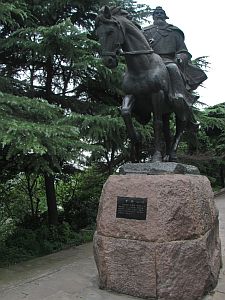 Hot Cao Cao Action So the last main man you need to meet is Cao Cao (pronounced tsow-tsow). He becomes the prime minister under the Han emporer after winning a series of battles, both of bloodshed and politics. He spends all his time working to become the next emporer and holds the court utterly in his sway. I think Machiavelli is a pussy next to this guy. At one point he has the empress beaten to death and nobody says a word. He is the epitome of an opportunistic politician, if there’s any way to achieve his desired end, he will take it without a thought. He routinely shows public regret on his actions killing people, their friends, their families, their pets and… you get the picture…but the regret always seems purely politic to make him seem more like an acceptable confucian king. I’m not sure he has anything but statues commemorating his contribution to history.
The story that best shows his character is when he is running from a bad defeat very early in the story and seeks refuge with his uncle. His uncle welcomes him and his aide and bids them make themself comfortable while he fetches some wine from the village and his family prepares a banquet. Cao Cao is sitting inside when he overhears a conversation between his family members outside.
“We’ll string him up tightly, there’s no way he’ll get out of this….his life is ours”…followed by laughter. Cao Cao’s paranoia overcomes him and he and his aide rush out and slaughter everyone in sight. Members of his own family. Imagine his surprise when he finds a trussed up pig awaiting slaughter. Filled with fear and regret he flees and meets his uncle on the road, returning with the wine. Thinking quickly, Cao Cao kills his uncle on the spot so no-one will know what happened and to avoid revenge. Keep your friends close and this guy as far away from you as possible.
Right, that’s it. There’s a host of other dudes who will come into the picture over the story, but this crew are the main contingent. So onwards and upwards to the next post where we have a look at the Kingdom of Wu, who were based in modern day Wuchang (now the eastern side of Wuhan), then later Nanjing (the first time it was used as a capital city).
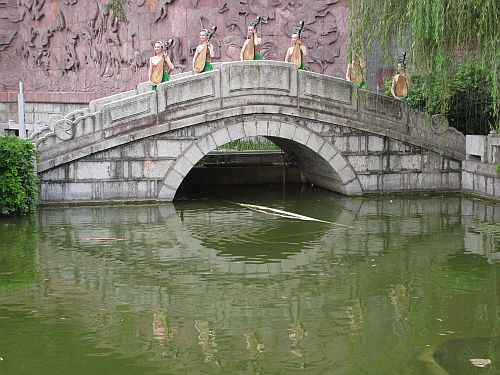 Cute girls with lutes in Wuchang's Yellow Crane Tower - in modern Wuhan.
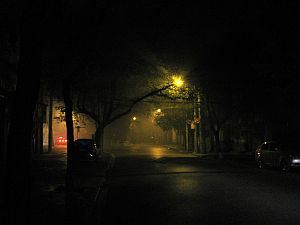 Xi'an by winter night The sharp, cold air bites into my face as I walk slowly, scanning the buildings around me. It’s three in the morning and I’m looking for water and beer. The amazing conversation with another Australian guy who’s been living and travelling in China for five years finished one beer early. We both wanted another, but the hostel staff had quietly closed shop and left us alone in the restaurant. I considered the sleeping option and became determined to have a nightcap and some water to help with the beer I’ve already had. When I reach the entrance to the hostel, the girl who sleeps there to let people in is already awake.
“You want to go outside now? Nothing is open.”
“Yeah, I need water and beer.”
“I think nothing is open now, in the morning you can try.”
“There’s always a shop somewhere. I’ve been in China a long time now and I know there’s always a shop open.”
Another voice sounds from the makeshift bed in the foyer and the girl moves to let me out.
“You can find one for yourself then.”
“Thanks. I will.”
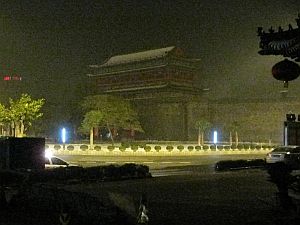 Xi'an's south gate They pushed the snow to the side of the street already and the temperature is about zero degrees celsius. There’s not much life apparent in Xi’an at this time of the morning. Most shops are closed, but taxis still flit about, pausing near me in case I signal one to stop. I turn the corner onto the main street and head towards a group of people I can see there. It’s a night market selling noodles and soups to people coming out of a nearby nightclub. There are a few different stalls and I can get barbecued meat, stir fried rice or noodles and vegetables. But no beer or water. I turn to walk past the nightclub, there’s often a small shop open close to them taking advantage of the evening’s revellers. I pass two cigarette stands on the street, but there’s no shop evident.
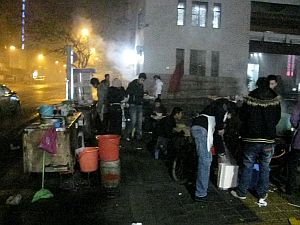 Xi'an Nightmarket Ah-ha…there’s the answer. A restaurant. I’m served by a girl who seems to be about fifteen and manage to acquire my beer, but they don’t have water. Like many restaurants the only water you can get is in the form of tea. I head back into the night and decide I can always boil the jug in my room for water if I can’t find another shop. A few minutes later I notice a large box by the side of the road with a picture of bottles of water on it. I haven’t seen this before in China, so I move closer to investigate.
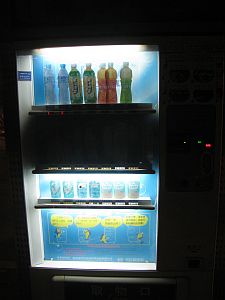 Water Vending Machine It’s a vending machine. Jackpot. I don’t need to keep looking, my shop is here. My fingers are cold now from holding the beer in one hand and a cigarette in the other, so it takes a few fumbling attempts to feed a five kuai note into the machine. I arrange myself two bottles of water and pocket the change before moving back towards the hostel.
The whole trip has taken just fifteen minutes and the girl lets me back in with a smile as she sees my arms full.
“There’s always a shop somewhere”, I sagely advise her.
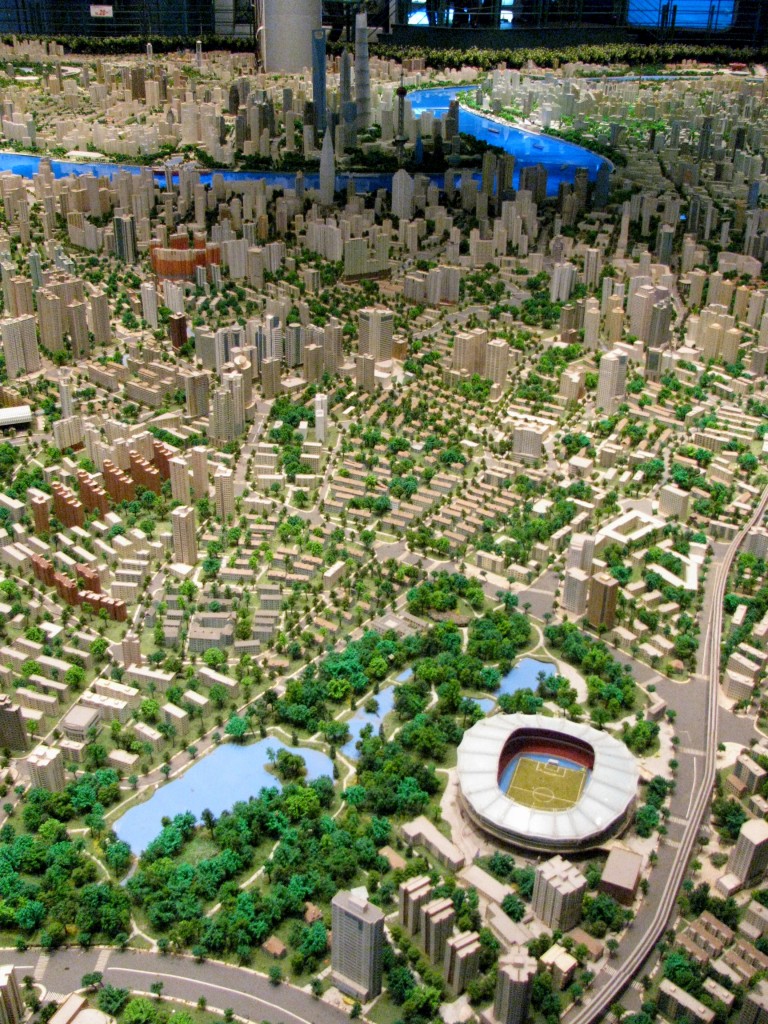 Looking towards Pudong This room is one of the most astounding things I’ve ever seen. They have spent a lot of time and money creating the ultimate urban planning dream; a complete architectural scale model of the middle of Shanghai city. All the buildings are there placed individually along the streets and by the river. Bridges and tunnels are carefully constructed and shown in place. Parks and riverside walks are shown as well. The Expo 2010 buildings are in place to show how they will become a part of the city and the frame of the Shanghai Tower currently under construction in the Pudong area is shown finished as well. This will become the tallest building in China in 2014 and the second tallest in the world; beaten only by the crazy Burj Dubai. The only thing missing from this amazing model is a dinosaur crushing buildings beneath its feet whilst breathing fire and emitting strange noises. Perhaps that would be just too Japanese for the locals.
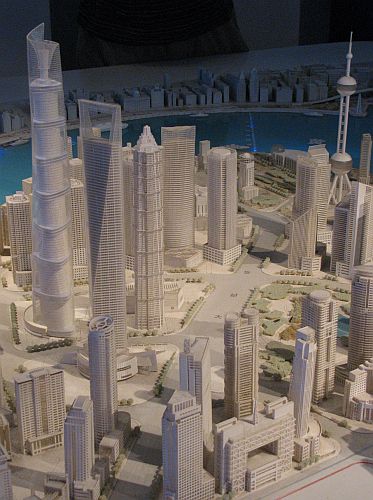 Pudong - Including the Shanghai Tower on the left that is still under construction Many Chinese people still hate the Japanese for their world war two atrocities; the rape of Nanjing is kind of hard to forget – even seventy years later. Now this makes it even stranger to me that Shanghai’s World Financial Centre seems to be modelled on a Japanese sword rammed into the heart of Shanghai’s financial district. The building company and major organizers were Japanese, so is this a deliberate action? Probably. Apparently when it was being built there were protests over the shape of the distinctive hole in near the top of the building. It was to be round, which resembles a moon gate, a distinctive part of Chinese architecture. However, that design also looked an awful lot like the Japanese flag flying on top of the sword. It got changed to the rectangular shape we see now, which made some people happier, but most people saw something entirely new. The Shanghai Bottleopener. I still haven’t found one in a souvenir shop, though.
I wander around this amazing model, drinking it in and thinking what a useful thing this would be for urban planners and developers everywhere. When you want to know how a new building would really impact the surrounding landscape, you can slot it in and have a look at it from any angle. Check for annoying shadows and reflections, notice that it’s too big for the land you own and realise that it’s just perfect for looking at the bikini clad women in the hotel’s pool next door. It takes a while to see everything, but you can walk around the entire model, then go upstairs and look down on it from the next floor too. As a final trick, you can go into a special round room that has projectors rigged up to provide a computer generated 360 degree view of the city as seen from a boat the river. It shows in some detail how the Expo site in particular will look when it’s finished, but there’s a little detail that leaves me chuckling as I wander out of the building.
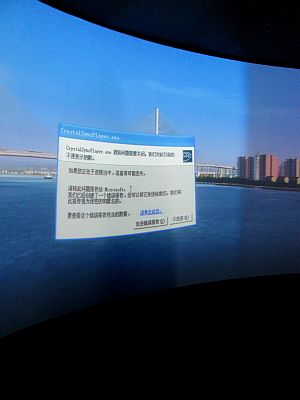 Bad software is everywhere... Right in the middle of one of the projector screens, hanging there motionless while the scene moves around is a windows error message waiting for someone to click on it. Not even the Chinese government can change this small part of modern life.
I’ve decided that I will begin my journey into China’s interior today. Nanjing will be the first stop and I’ve already acquired a ticket on one of the new fast trains. You can find agencies all over the city with English speaking staff to make this easy. So I launch myself into the madness that is a Chinese inter-city train station for the first time. I can’t believe the sheer number of people who are gathered around the front of the train station, apparently ready to travel; but going nowhere. It’s an often repeated scene and I spend far too much time considering why they’re always there in droves. Maybe they plan to meet hours before the train leaves to make sure they all manage to arrive. Maybe they just think it’s cool to hang out at train stations with your baggage to make it feel like you’re going somewhere.
“You think you’ll go today?”
“Nah, just enjoying the dream. Don’t have any money anyway.”
“You want to play cards?”
“Nah, I’ve got a mahjong set here, you want to start a table?”
“Mahjong? Hell yes, let’s do it”
There are people gathered together with the cluster of their bags playing all kinds of games to pass the time. I suddenly wonder if they’re gambling the contents of the bags as a kind of lucky prize draw. Maybe it’s empty, maybe it’s filled with electrical appliances. Who can tell what will happen with the crazy wheel of train station roulette!!
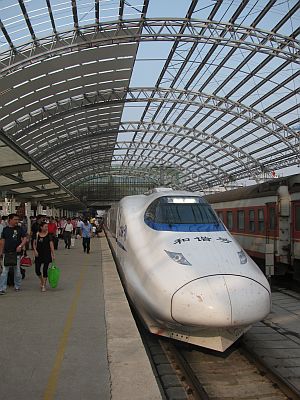 Hot Fast Train Action I’m brought back to reality by an announcement in English that another train is ready to board. I’m relieved I will hear the right warning, then search for my ticket and join the crowd passing through security at the door. The level of concern shown varies greatly at different bus and train stations. In Shanghai you have to have a ticket to pass through and absolutely everyone has all their baggage x-rayed. In Xiangfan bus station a disinterested guard sitting next to an x-ray machine watches the hordes passing by without a care in the world. In most bus stations there is also a metal detector frame you walk through without ever being stopped. Maybe they just count the loud beeps it makes as each person passes through. Back in Shanghai I’m staring at a huge electronic board looking for my train number. It tells me where I need to go to wait for the gate to open; signalling a thousand screaming Chinese warriors who will storm through the station to commandeer the first train they find. Okay, so that’s just what it feels like when you’re getting onto the train within a Chinese mob. They push, surge and try to generally outdo each other in getting to the train and then their seat before you. I think the video cameras in any train station would make quite fascinating viewing with the right soundtrack. Something loud, heavy and utterly overwhelming. Carmina Burana. The opening song, O Fortuna. They should play it through the loudspeakers to make everyone seem more normal.
The train itself is a lot better than I was expecting from the Chinese train system. My friends who have been here before warn me of filthy toilets, crowded carriages and the stink of cigarette smoke permeating your existence. Smoking is utterly banned on the fast trains, the carriages are spacious with comfortable new seats and the toilets are spotlessly clean – and you can even get a western style seat toilet. I lock up my bags and head for the dining car to see what they might have for me. I see other people getting a microwave dinner style tray with rice, meat and vegetables separated out; so I jump on the bandwagon and grab one for myself. I notice beer siting in a fridge and add a can of Tsingtao to the order before returning to my seat to feed my face. It’s exactly what you expect from a microwave dinner, just with genuine Chinese food in it. The trip with take just two and a half hours to cover the five hundred odd kilometres to Nanjing, so I settle down to sort through some pictures I took in Shanghai as the countryside rolls by the window.
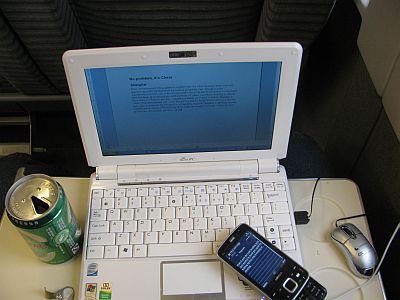 The Fast Train Workstation
|
A sample text widget
Etiam pulvinar consectetur dolor sed malesuada. Ut convallis
euismod dolor nec pretium. Nunc ut tristique massa.
Nam sodales mi vitae dolor ullamcorper et vulputate enim accumsan.
Morbi orci magna, tincidunt vitae molestie nec, molestie at mi. Nulla nulla lorem,
suscipit in posuere in, interdum non magna.
|
|












